#there are so many overarching issues that need to be fixed first
Explore tagged Tumblr posts
Text
-
#not to be too college educated but the way people blame everything wrong with today’s youth and modern society on social media and the#internet feels like the epitome of a cop out#there are countless scientific studies on the topic that say that blaming everything on social media is reductive because there are social /#societal contextual factors that are the actual root of the problem#it irks me especially when politicians say it like banning social media to kids is gonna solve everything#man if u don’t fix the actual problem ?????#i literally have a degree in this u have no idea how much it bugs me#kids are getting brainwashed by instagram but the article u found on facebook saying social media is the root of all evil is totally#right okay ma’am ❤️#there are so so so so issues in our society that could and should be fixed but instead of doing something u have these grownass people#saying ‘social media bad waaaaaah’#and im speaking as somebody who does not like social media and doesn’t use it much actually#there are so many overarching issues that need to be fixed first#sorry im annoyed#and again i have a degree in this so i am right
3 notes
·
View notes
Text
well since i can already tell that we’re all going to be subjected to the same old tired mai & mai.ko discourse for the foreseeable future, let’s get it clear right now that the atla comics have never been, and will never be acceptable mediums of character development, and here’s why:
1. the comics are given the benefit of hindsight, which impairs organic character growth.
it’s become extremely clear over the last few years that many of the comics are made as, or include, direct responses to criticisms of the original show — especially when it comes to katara, mai, and the canon pairings. aang didn’t ask katara for consent? look, he’s checking if he can kiss her! mai doesn’t care about fire nation imperialism? here, she’s an anti fascist! iroh was a creep to june? don’t worry, here he is apologising!
many of the things the characters do or say in the comics feel unnatural because they are not written as characters, but as mouthpieces for the creators to address fandom complaints from the original show.
“but that’s good, right? they’re trying to make it better!” i mean… sure? it still doesn’t change the fact that it’s damage control, and that no matter what stories span the middle, the arcs of these characters still begin and end with avatar: the last airbender, and the legend of korra, both of which are fixed and immutable. the comics cannot retroactively fix the issues of either show, because they’ve already been defined as the goalposts of the characters’ lives, and there is no way to undo that.
it’s like if you eat a meal that isn’t to your satisfaction, and maybe the chief makes you another dish, which is all well and good — but it doesn’t fix the fact that the original meal still sucked! sometimes, accepting criticism means accepting that there’s no way to go back and fix it but to do better next time, with the next story you wish to tell.
if the legend of korra didn’t exist, and the arcs of the characters were left open after atla, then maybe there would be for the room for the comics to function as character development if not for the fact that…
2. the comics are intended for a very different audience than the show.
it’s obvious that the audience for the original show vastly outnumbers the audience for the comics, likely by thousands, if not millions. this isn’t the mcu, where the installation of any atla property is vital to understanding the next, and so on. you can skip the comics and miss nothing whatsoever (and honestly your life would be far improved by doing so).
those who read the comics are likely only the real diehard fans of the show — and the creators know this, which is why we have the whole issue of point one above. but this difference in audience matters, because it reflects the significance of the story being told, and how important it is for the audience to know it. this is why, if the characters’ development and storylines in the comics truly, genuinely mattered, it would have been in the show already.
i’m not saying that the gaang wouldn’t have continued to grow and change post-atla, but generally stories exist as closed circuits, self-contained within themselves. when you end atla, you’re meant to believe that those arcs are finished. that’s the whole reason the comics deal mostly with fun silly adventures, or with quick, temporary conflicts instead of grand, overarching narratives, because they are not truly meant to function as a continuation of the story of atla, or its characters.
(if you ask me frankly, they’re meant to be nostalgia cash grabs, but that’s neither here nor there.)
creator intention matters with the atla comics (or any atla property, in fact), because creator intention was the subject of criticism for the original show in the first place. why must we rely on the comics or the cookbook or avatar legends to tell us that katara did things with her life outside of aang? why do we need to turn to something released nearly two decades after atla to find any evidence that mai denounced the fire nation’s imperialist indoctrination, when she’s romantically involved with one of the show’s most important characters? why are these stories relegated to a medium with far less reach, far too late?
the answer is that the writers didn’t find those stories to be originally worth telling, and that is the real problem fans have been pointing out since 2008.
so, tldr:
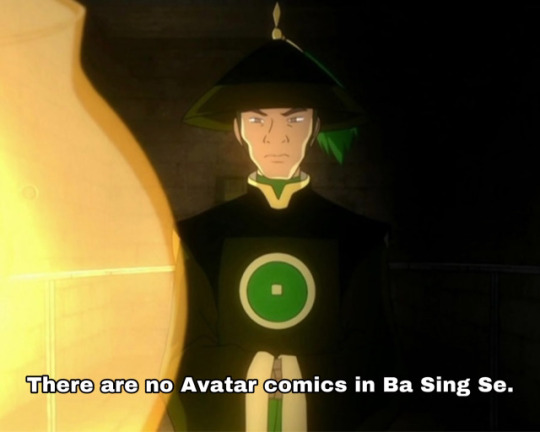
#anti atla comics#anti bryke#anti kataang#anti maiko#of course this isn’t even getting into the fact that for every supposed moment of character growth in the comics#there’s like a dozen terrible moments of the most ooc nonsense#i still can’t believe trees died for the atrocity that was the promise
176 notes
·
View notes
Text
How I would fix Helluva Boss
I've been getting the passion to talk about (and criticize) this show lately, and I'm planning to make a giant post about season 2 covering each of the episodes (and my issues with each of them), so that post will come soon (though it might take awhile since I need to rewatch each episode). We all know that Helluva Boss has become kind of a mess, so how could we fix this show and make it good? With all the writing issues it has how could we fix it all?
It's actually quite simple, really. In my last post talking about this show I pointed out how it barely actually revolves around its main premise and how only 3-4 out of 15 episodes are related to it. So the way to fix Helluva Boss is to make it revolve more around its premise.
Since we're revolving the show more around its core premise, it's best to get rid of every single plotline that isn't tied to it (The stolitz stuff, Moxxie's abusive dad, Stolas' drama, Blitz trauma, his feuds with Verosika and Fizzarolli, etc), and only relove the show around the core premise. This would fix the problem of the show barely revolving around its actual premise and would also make it feel more focused since now there are fewer plotlines to focus on (one of the show's major problems is that it's waaaaay too unfocused).
Basically, just remove a majority of the show's plotlines to make it more focused on the I.M.Ps going to the human world to kill people for clients (like the actual premise). The exceptions here are the Cherub and Dhorks plotlines, since those are tied to the show's premise, they can stay, and maybe make both groups recurring antagonists that get in the way of our main characters doing their jobs.
Just make the show a fun episodic adult comedy show about a group of assassins going to the human world to kill people...ya know, like how it was advertised before Viv decided to make the show into a drama with fan fiction-level writing.
Other things would include developing some of the characters more (please for the love of god give Millie and Loona more than one or two character traits), and of course, with these changes, this would also mean that we would have to remove all the episodes that aren't tied to the show's premise...which is most of them. So we're just gonna delete every single episode EXCEPT for Murder Family, Cherub's, Truth Seekers, and Unhappy Campers. We would also need to change the ladder two episodes a bit by removing any connections they have to the plotlines we just removed, the first two can stay the same.
And...that's it really. Now we have a fun episodic dark comedy show that's more focused and wouldn't have a majority of the writing issues that the show we have right now does. In all honesty, Helluva Boss would have been better off as a semi-episodic show because I think it's clear that Viv does not know how to write a serialized show with an overarching story and character development, which is due to a combination of poor planning and incompetent writing.
Helluva Boss does not feel like it was planned at all, and if it was it was planned very poorly, and looking at the writing it clearly shows. Plotlines so far have gotten rushed and underwhelming or straight-up insulting resolutions and the show keeps throwing so many ideas at a wall it quickly becomes very unfocused. Like I said the show suffers from there being too many plotlines and the writers not knowing how to write them.
That's why I decided to gut all of the darker and more complex plotlines that weren't tied to the show's premise, because it's clear the writers don't know how to write a lot of these plotlines and again, the show has too many of them and removing them makes it far more focused. And I left the Cherubs and Dhorks plot lines because those ones actually tie into the main premise. And trying to fix every single plotline would be almost extremely hard to near impossible so it's best to just gut most of them.
Helluva Boss should have been what is initially promised to be; a fun episodic show featuring some assassins going to the human world to kill people for their clients, not this poorly written unfocused mess we have now.
TL;DR: Revolve the show more around its actual premise and gut a majority of the plotlines so it could feel more focused.
Soooo...ya, that's how I would fix Helluva Boss. See ya.
#helluva boss critical#helluva boss criticism#helluva boss critique#hazbin hotel critical#vivziepop critical#I promise some non helluva boss related posts are coming soon#I don't want this blog to become a Vivziepop critical blog...#though this won't mean this will be the last time I criticize this show lol#so...ya#bye
41 notes
·
View notes
Text





By: JLCederblom
Published: Apr 30, 2024
One of the most basic errors you would expect to be caught in peer-reviewed academic literature is plain data errors. They require no real expertise to catch and tend to be trivial to fix. It’s simply part of regular proof reading that any serious article of any sort should undergo.
So why are papers on transition regret rife with ridiculous errors, such as inventing thousands of people out of thin air? And why do those errors occur in the first place?
Let’s have a look at the latest in a long line of peer-reviewed garbage: “A Systematic Review of Patient Regret After Surgery- A Common Phenomenon in Many Specialties but Rare Within Gender-Affirmation Surgery” by Thornton et al.
This piece self-identifies as a systematic review, which it simply isn’t, but that’s rather technical (and, dare I say, academic) compared to the grievous errors in the paper, and will require some back-and-forth with the journal. Going over all of that in detail will take time and isn’t that interesting — although if the paper does get corrected or retracted, it’ll likely be due to such procedural issues rather than overarching problems.
While many individuals report satisfaction and improved measures of mental health after undergoing gender affirming surgery, there is a small but vocal minority who experience regret after their procedures.⁴ De-transitioning, also known as continued gender transition, has been exhaustively covered in the mainstream and conservative media and is an emerging area of study in gender affirming care.
The paper also has a rather noticeable disdain for the subject matter and a clear agenda with the goal of minimizing transition regret as a niche, “exhaustively covered” issue, championed by a “small” but unnecessarily “vocal” group.
Let’s have a look at the sources the paper cites for the rate of regret.
* * *
First up: Wiepjes et al., 2018.
A study performed in Amsterdam retrospectively examined 6,793 patients who attended a gender identity clinic in Amsterdam from 1972 to 2015 and found 0.6% and 0.3% of transwomen and transmen reported experiencing regret after gender affirming surgery, respectively. The authors noted that reasons for regret could be divided into three categories. True regret was defined as regretting having GAS. Social regret involved losing touch with loved ones or being fired from a job because of GAS. Lastly, some participants reported feeling non-binary and no longer feeling satisfied with their surgical result. Average time to experiencing regret was 130 months (more than 10 years) post-operatively.³⁰
This is simply erroneous. The authors make the claim that Wiepjes et al., 2018, measured reports of “experiencing regret after gender affirming surgery”. This is false, as the study first required hormonal detransition, the cessation of cross-sex hormone treatment and going back on your natal sex hormones, at the same clinic. Every time the authors describe this as only measuring “experienced regret” they are not being truthful.
In addition, the number who were investigated for this rather specific definition of regret was not 6,793 but 2,627. I’m not sure what the exact purpose of putting the number of people who visited the clinic, including those who never transitioned whatsoever, is but it certainly inflates the number.
You might ask yourself how it’s possible that the authors read Wiepjes et al., 2018, but did not manage to understand what was investigated, nor how many people were looked at. The most likely answer, to me at least, is that none of the authors, peer reviewers, or editors, actually read the paper.
* * *
Next up: Bustos et al., 2021. If you need a primer on this, I’ve written about it before.
In 2021, a systematic review and meta-analysis was completed which assessed 27 studies, including a total of 7,928 transgender individuals. One third of the included individuals underwent transmasculine procedures, while the remaining two thirds underwent transfeminine procedures. Of the 7,928 individuals included in the analysis, 1.0% expressed regret. The most common reason for post-operative regret was “difficulty/dissatisfaction in life with the new gender role.” Another common reason was failure of surgery to achieve their aesthetic surgical goals. The authors hypothesized that the rate of regret established by this metanalysis was lower than a previously established rate from 1993 due to increased rigor in the selection process before gender affirming surgery.
Bustos et al., 2021, pulls together all the greatest hits of gender pseudoscience: erroneous data, fraudulent methods, zero peer-review, irresponsibility (or perhaps hostility) from the journal, and more. It’s a paper where the factual error count is in the triple digits to this day.
However, after wrangling the arms of the journal editors a bit, they put out a partial correction (where they actually introduced some new errors as well as fixed a handful). The lowest possible bar you could hold the authors against in this 2024 paper is that they used that 2022 “correction.”
Of course they didn’t.
An inability to even copy and paste numbers is what we’re dealing with here. From the entire chain, authors through editors. It ties into the previous paper as well—if Thornton et al. had read Wiepjes et al., 2018, they would be entirely equipped to see through Bustos et al., which makes the exact same nonsensical mistakes they did.
I would provide an exact number instead of 7,928 here, but it’s not actually possible to do that because one of the included papers reports contradictory numbers, which Bustos et al. didn’t mention or, more likely, even notice. Another provides an estimate rather than exact figures. They also included papers which did not investigate a regret rate in the review, which is just bizarre.
Either way, out of the claimed 7,928 people, at least 3,400 were not investigated for regret in any way. As previously mentioned another 2,627 had a requirement that you had to hormonally detransition in order to count as regretful. Another didn’t measure regret at all, simply legal sex marker reversals. If you go through the papers and add up the number of people who were explicitly asked about regrets (in any way) you get around 1,300. With unknown loss to follow-up, often very short follow-up, and no uniformity to the way they were asked.
Which apparently to Thornton et al., the peer-reviewers, and the journal editors, is enough to conclusively state that we know the rate of transition regret.
* * *
Next up is Narayan et al., 2021, which was a combined survey and systematic review. See if you can spot the sleight of hand.
Another study surveyed all surgeons registered for the 2016 World Professional Association for Transgender Health and the 2017 US Professional Association for Transgender Health. Most respondents practiced in the United States and had surgically treated at least 100 transgender or gender-nonconforming patients. Of the 30% of surgeons that completed the survey, 61% respondents had treated at least one patient who experienced regret or requested reversal of a procedure. Overall, the calculated rate of regret after gender affirming surgery was 0.2%-0.3%. Of the 62 patients that respondents reported had sought reversal surgery, reasons for reversal included surgical complications, continued evolution of their gender identity, rejection or alienation from social support, and difficulty in romantic relationships.⁵
An anonymous survey of WPATH or USPATH conference attendants with 70 percent non-respondents (fairly catastrophic given the population), asking them to estimate the number of patients they’ve surgically transitioned (somewhere between 18,125 and 27,325) and how many patients they’ve “encountered” (meaning what?) who “regretted their gender transition” (open for a wide range of interpretations) is not a very serious approach.
The paper sometimes treats “regret,” “reversal request,” and “detransition” as the same thing, sometimes not. The authors (both Narayan et al. and Thornton et al.) seem very confused about what the respondents were actually talking about. Usually, when you’re confused, the right thing to do is to slow down and work it out. Not to take the decision to treat 62 patients seeking surgical reversal as “the regret rate”—which is absurd, and reveals the authors’ intellectual, or rather emotional, bias towards presenting as low a number as possible.
* * *
Next up is Bruce et al., 2023.
Recently, research from the University of Michigan demonstrated low levels of regret after gender-affirming mastectomy in a cross-sectional study. On average, respondents underwent surgery 3.6 years before the survey. The median Decision Regret Scale score was 0.0. Further, of the 139 respondents, zero requested reversal procedures.³²
The respondents certainly reported low decision regret. Of course, 3.6 year mean follow-up is less than most studies put the average time to regret at, and a 40 percent non-response rate is… an issue. It’s also exclusively following mastectomy, and that this often provides (at least) short term relief from breast-related distress seem highly plausible.
If Thornton et al. was a systematic review rather than a literature review with a (very poor) systematic search, these issues would be explored and Bruce et al. would take its rightful place as low quality evidence for potential short term benefits. Presenting it as evidence of a low regret rate, however, is ridiculous.
On a side note, Bruce et al. also cites erroneous data from Bustos et al., this time regarding follow-up times rather than sample sizes. It truly is the gift that keeps giving in terms of academic misinformation.
* * *
The final thing referenced is the 2022 USTS Early Insight report.
In February 2024, the 2022 US Transgender Survey Early Insight report was published, providing data from 92,329 binary and nonbinary transgender people. This report noted that 97% of respondents who had undergone gender-affirming surgery reported that they were “a lot more satisfied” or “a little more satisfied” with their lives.³³
This was an anonymous online survey recruiting participants via advocacy groups, and described as “a survey for trans people, by trans people.”
When Thornton et al. describe it as “92,329 binary and nonbinary transgender people” they actually get that wrong as well, as the report describes it as “38% nonbinary, 35% transgender women, 25% transgender men, and 2% crossdressers.” This may seem like nitpicking, but it actually describes the inconsistencies of the worldview that Thornton et al. champion.
Other than poking fun at them, there isn’t much more to say here. The Early Insight report doesn’t discuss regret, which is why they didn’t claim it did. Which would make it odd that they put it under the heading “Regret After Gender-Affirming Surgery” if you’re operating under the assumption that Thornton et al. are writing an academic paper, but that’s clearly not the intention.
* * *
Human writing has many purposes. The most obvious is communication, to convey thoughts and ideas to others. But we also do it for fun, or to assist ourselves, to organize our thoughts, all sorts of ways. Academic papers of this sort, however, are supposed to have a single purpose: to inform others.
When people write falsehoods, figuring out why they do so is interesting. It tells us something about them. For example, when Thornton et al. repeat erroneous data about papers, it tells us that they didn’t care. Despite using emotive language about regret, it tells us that they don’t care enough about the reality of regret to even read a six page paper (a very low bar), but they were happy to write a paper about it.
So why did they write this paper, despite not caring about the topic?
Research on regret after gender-affirming surgery poses unique challenges, as patients may fear that their regret could be weaponized against the transgender community. Those who seek to limit access to GAS often use regret as a key element in their arguments and in proposed legislation.
The aim of Thornton et al. appears to be to muddy the waters and push their own narrative, as the errors are not random but rather all go in the same direction. They are concerned with the consequences of regret, not regret itself. They simply aimed to distract people, and to breathe some new life into old misinformation, and they accomplished that.
There’s a steady stream of blatant garbage flowing through journals in this field. It’s not the replication crisis of science at large, or publication bias, and it’s not about large scale matters out of control—although structural vulnerabilities in the publishing process of journals is of course an issue.
In the end it comes down to emotionally driven choices by the individuals involved allowing falsehoods to be printed. The paper is a thinly veiled ideological document masquerading as science, but whether it highlights the complicity or just the illiteracy of the peer-reviewers and editors is yet to be determined.
*This article was originally published on JLCederblom’s blog on Medium.
==
They don't care about protecting people, they only care about protecting the cult. The point is to portray the cult as infallible, that the dogma and the doctrine is never wrong, it's only the members following the doctrine and dogma that are wrong. They don't have enough faith. They were never a true Scotsman. All the usual stuff.
#JLCederblom#transition regret#detrans#detransition#ideological corruption#corruption of science#systematic review#literature review#academic fraud#compulsive lying#compulsive liar#pathological liars#medical corruption#medical scandal#religion is a mental illness
9 notes
·
View notes
Note
Oh, question!! If you don’t mind sharing; what things do you plan on expanding upon in your series?
So, for the upcoming rewrite of "The Risen Lamb and the Fallen God," some overarching things I want to do are to add much more detail to scenes that seem flat to me, fix pacing issues (readers tell me my pacing is allegedly great, but I've improved enough in the last year to catch many places I'm unhappy with), and focus on showing rather than telling.
Some key parts I want to add, content-wise, include:
Draw out the "enemies" stage (or, at least, definitely-not-friends-yet stage) of the enemies-to-friends-to-lovers hullabaloo. The first fic of the original series will be split into at least three chapters.
Relics of the Old Faith content will be added. Most notably, The Lamb will have the opportunity to revive the Bishops pretty early on. Will they take it? You'll have to see.
Add more scenes wherein Lamb needs to build up their crown powers now that they've attained godhood. The best one to help with this is Narinder. He is not willing to help, initially, for obvious reasons.
Narinder and Lamb interacting with other characters more that aren't each other! Especially building upon Lamb's relationship with Ratau, Narinder's friendship with Thenana, and Narinder trying not to maim interacting with other cultists.
At least five new chapters with brand-new shenanigans.
Some smaller details I plan to include:
Narinder will take the role of the undertaker, now that this is a role followers can do in the cult.
Narinder struggling with chronic pain and mobility issues, especially at the beginning.
More crusading together and silly side adventures.
And many many many more things I have detailed in a plotting document that's three pages long and I'm only halfway through my reread to help me brainstorm.
I haven't written in three days and it feels fucking bizarre, but I needed a bit of time to step back from it after taking on my 30-day writing challenge. Would've made more sense if I did it in November for NaNoWriMo, but whatever!
8 notes
·
View notes
Text
//so... i have (finally) began trudging my way through the routes of wh again (done every route prior to rembrant's, sans klaus 2 because i am petty and still think it shouldn't have existed), and i've finally gotten to nox's route. just finished rembrandt's. and like... man do i have Thoughts. so i'm going to compile them and scream into the void. many of them will probably be on rembrandt's route, but that's because.... you know. the one i just finished.
first of all. narrative wise, i ADORE the continuation. i love how they are all in one connected timeline, it really brings such a finality to season 2 and it does, despite having its own issues, fixes what one of my biggest problems with the s1 routes (i.e. self contained story lines that don't connect anywhere). they introduce like, 80% of the cast that you're going to be interacting with and dating for the forseeable future and it makes it feel like a proper overarching storyline actually EXISTS!!! AND THERE IS ONE!!! AND IT WILL SOMETIMES REFERENCE S1 STUFF!!! IT'S SO GOOD. SO GOOD.
-100 points for having the rest of the s1 cast being almost fucking absent though. i understand that like. narratively they wouldn't always need to be there. however. i miss my boys. also -10000000 points for practically no amelia. where's my fucking wingman.
i 👏 love 👏 the 👏 night 👏 class 👏 boys. 👏👏👏 they feel like an actual friend group and shit like this makes me soooooo fucking emotional:
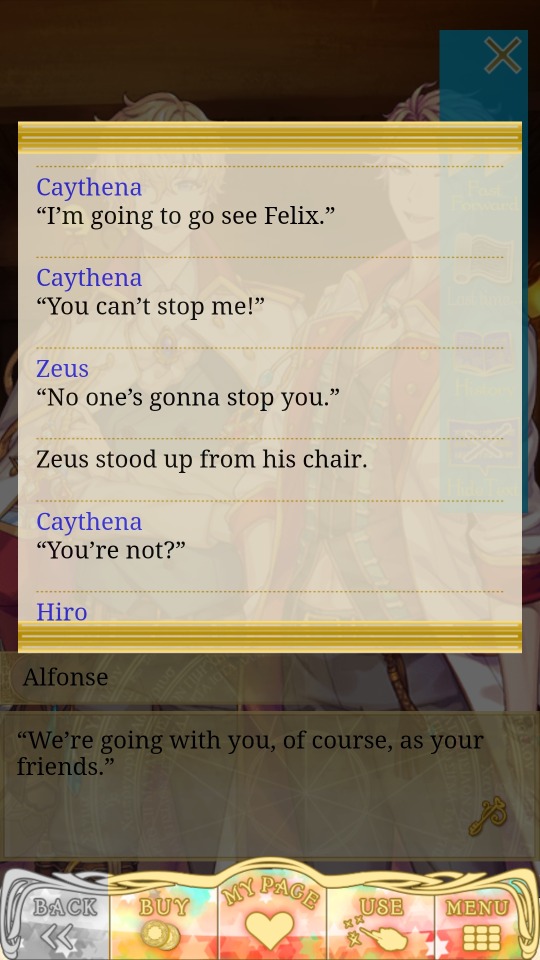
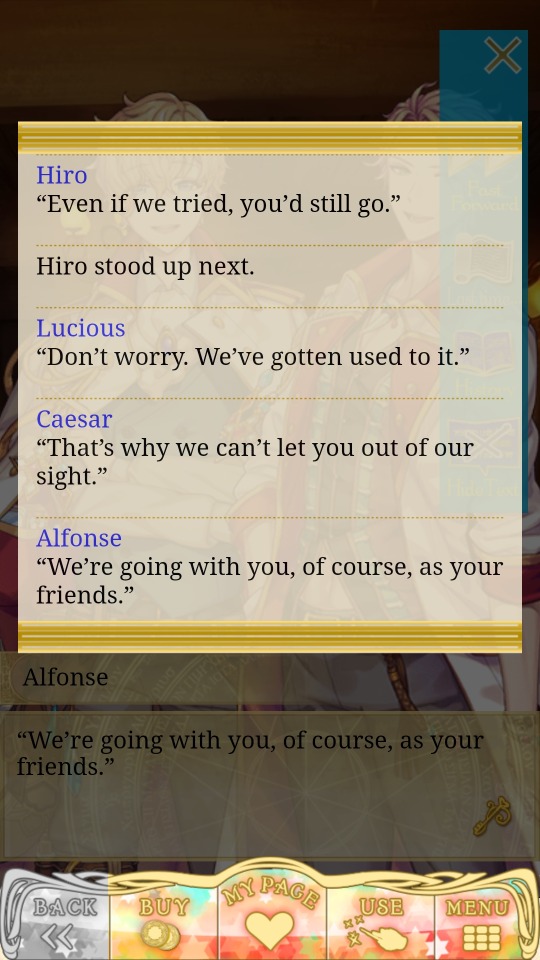
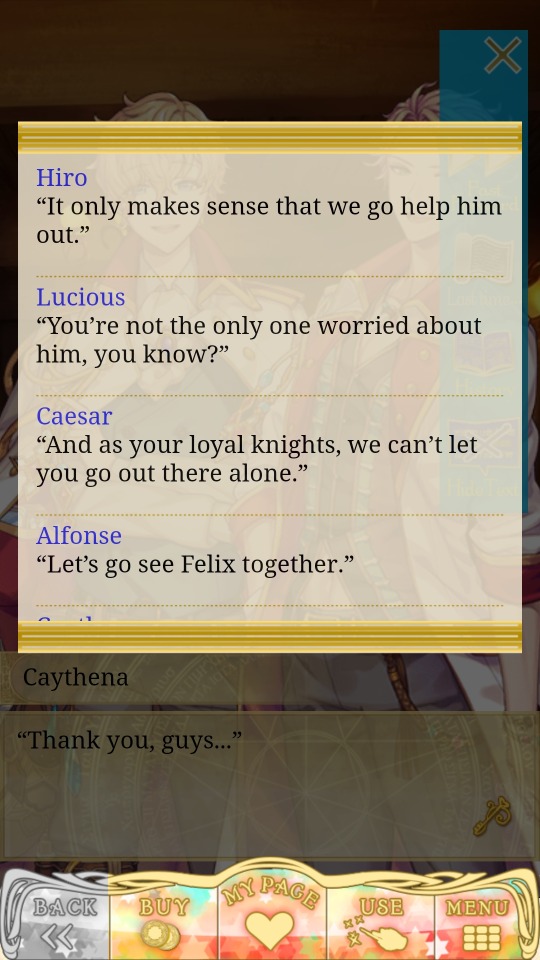
literally this makes me so feral. like, these people are liz's best fucking friends and it SHOOOWWWWSSS. the unconditional love here makes my heart want to burst.
i am eating so much good food lore wise. geography from bith hisoka and rembrandt's routes have me eating so good.
i like the time travel aspect well enough, though i do wish they did a smidge more with it? i'm not done with the rest of the routes yet obv but i'm curious to see if liz gets to keep her time powers. the end of rembrandt's route seems to imply that she lost them because the goddess crystal shattered, though?? status is currently unclear.
this line from mischa destroyed me:
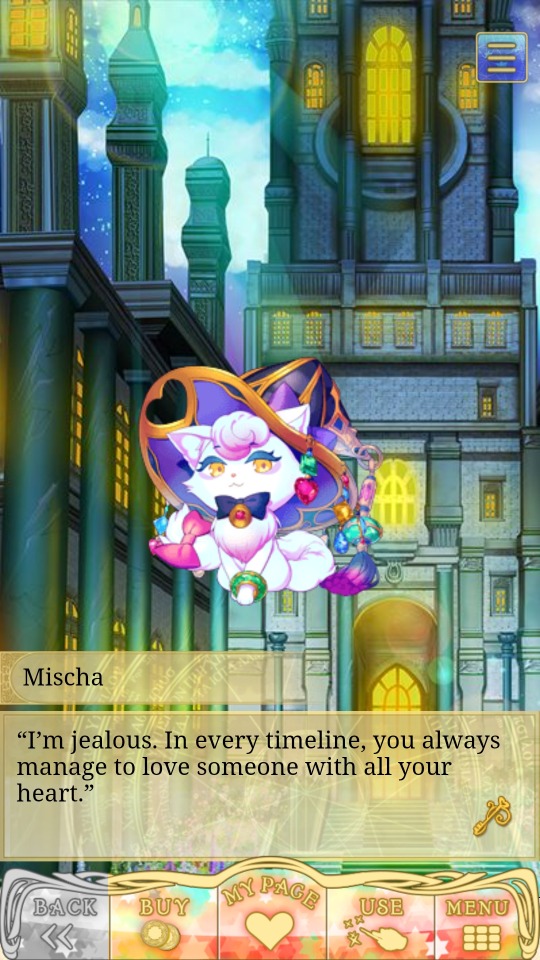
like seriously. what the fuck. this is such a good line. and it reminds me that hugo, vain, and mischa have seen so many possible timelines that exist, and yet there IS one where hugo decides to take his shot. i know they basically have everybody be in love with liz but i think it's especially cute but very cruel for hugo, who almost certainly falls in love with her every time he meets her in a different timeline. just something to think about.
speaking of mischa. i think it's fucking adorable how chica and mischa are pen pals. besties. refined ladies. we love them. idk why tumblr doesn't want me to upload the screenshot but it's really cute.
so. routes. hugo's and hisoka's felt like..... nothing? like sure, they had some Big Picture Plot relevance, hugo's moreso for obvious reasons, but hisoka's felt like a beach episode. really weird.
hisoka's especially felt like nothing. like, cool that they introduce beastmen and , subsequently,the not so cool furry racism (wow i love fe9/fe10). but like. what else did it do besides have rembrandt take his watch back. and some geography. it was a nice change of pace, but the stakes felt so incredibly low compared to the two other routes its sandwiched between. don't get me wrong, i love the ending that came out from it. i LOVE the market idea and i love how it was walter fucking goldstein that sponsors hisoka. i just wish that, like..... there was bigger things going on in it. cute route overall, but just felt a little out of place. also hachi is a 10/10 familiar. would give so many pets.
ok. so rembrandt. i love, like, a LOT of how this route is written, to an extent. it is SO full of lore and dragonkin biology. i also like the overt head-smashing symbolism of rembrandt's magic being called "twilight" - not quite day, not quite night. if i were any dumber i'd call it clever.
so. to go back to the bad. because i think, very ironically, rembrandt is the worst part of his own fucking route. it's not that i don't find rembrandt exceedingly pretty, because he is, and his characterization is kinda... good? but he's just not the rest of the cast. literally the rest of the s2 squad consistently make me smile and giggle like a child, while i'm giving the "romance" a 1000 yard stare.
like, seriously. this small convo with lucious is just fucking great and better than any dialogue liz and rembrandt have ever had:
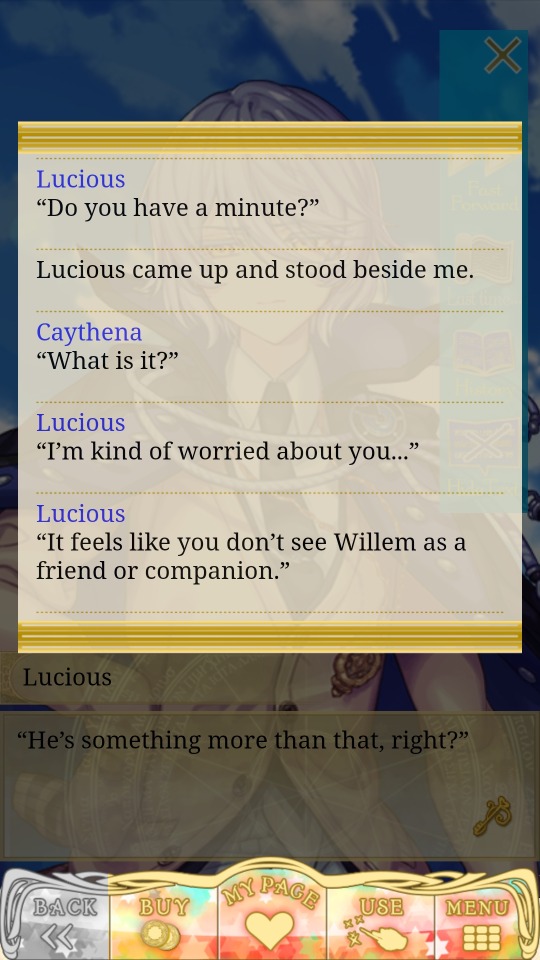
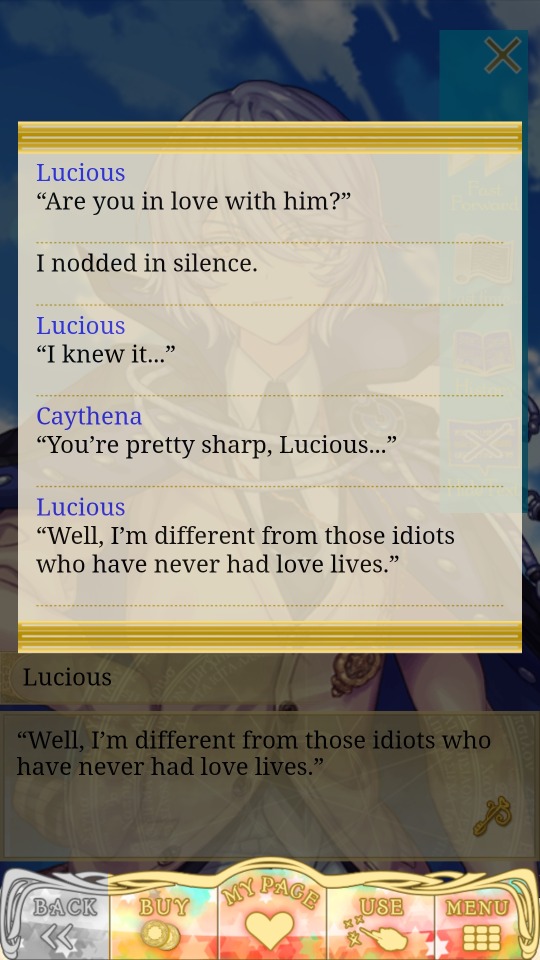
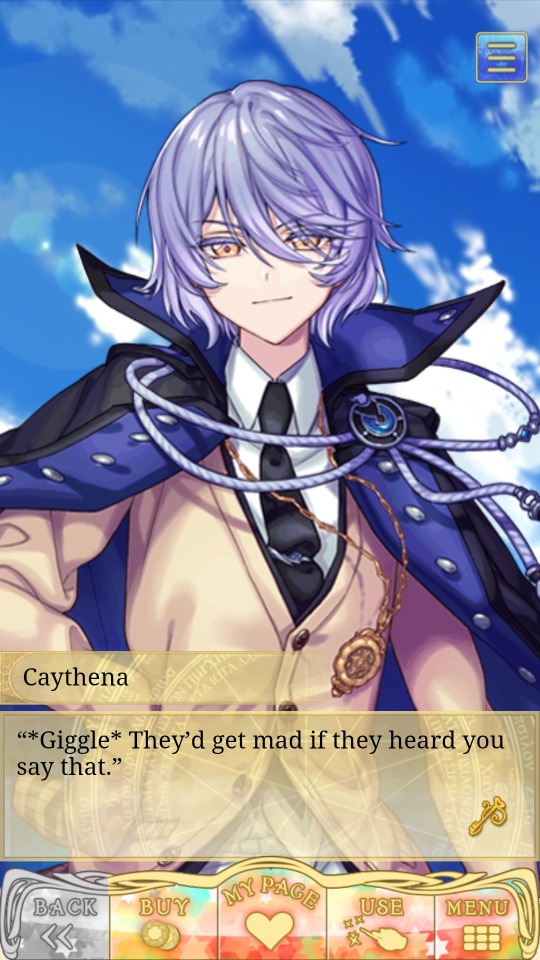
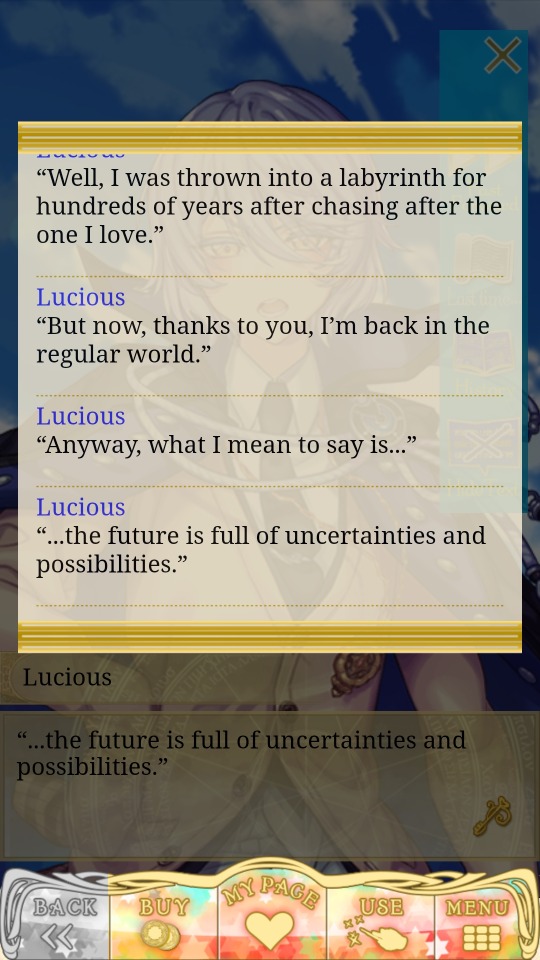
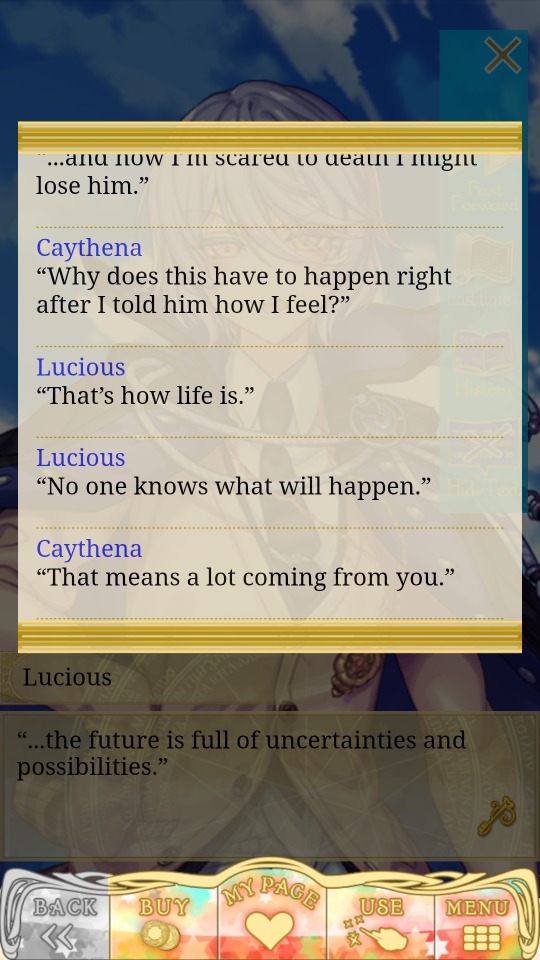
lucious calling his friends virgins is so funny. you go you funky little dude. never change, baby boy. but this is just soooo GOOD.
there's a lot of instances where they make it a point to show that the s2 cast really cares for liz, and that they are so comfortable around her. there's SO much good interaction and it's so cute... and then rembrandt is just. there. in the corner. losing his religion.
ok but seriously. let's talk about rembrandt himself for a sec. because like, rembrandt is fine. i appreciate that they don't beat around the bush that he is literally going to outlive liz. i also appreciate that everybody else is like, "do not fucking trust him, he is literally the enemy". unfortunate that due to the nature of the route liz is like "nuh uh" which makes everyone else be like "fym nuh uh". overall though i feel like he's just. too bland. which is WILD considering that he was a prison of war for like 1000 years. i know it's moreso that in his route he has (because of liz) finally started to trust humans again, but i wanted hesitation, i wanted DRAMA, a more romeo and juliet type beat!!! that came kinda close to it, but rembrandt being there and basically turning himself in is.... lame. very lame. sigh.
and then we have the incorporation of rembrandt into the main group. like, i love the night class boys SO much. and like, it bothered me a lot when liz would be like "oh don't worry rembrandt, we're your friends and you're part of the group now!" when rembrandt would do basically nothing but exist there. like, he barely interacted with them??? he felt very out of place, especially when the rest of the boys were still unsure about rembrandt. at least make fun of zeus like the rest of us, old man.
also. the plot point where rembrandt met liz when she was a kid, and she changed his whole outlook on humans..... uuuugggghhhhh. felt very unnecessary imo. it's like they just wanted to slap in another romance trope to make up for the fact that there wasn't a lot of romance to begin with. uuuuugggggghhhhhhhhhhhhhhhhhhhhh.
this was funny:
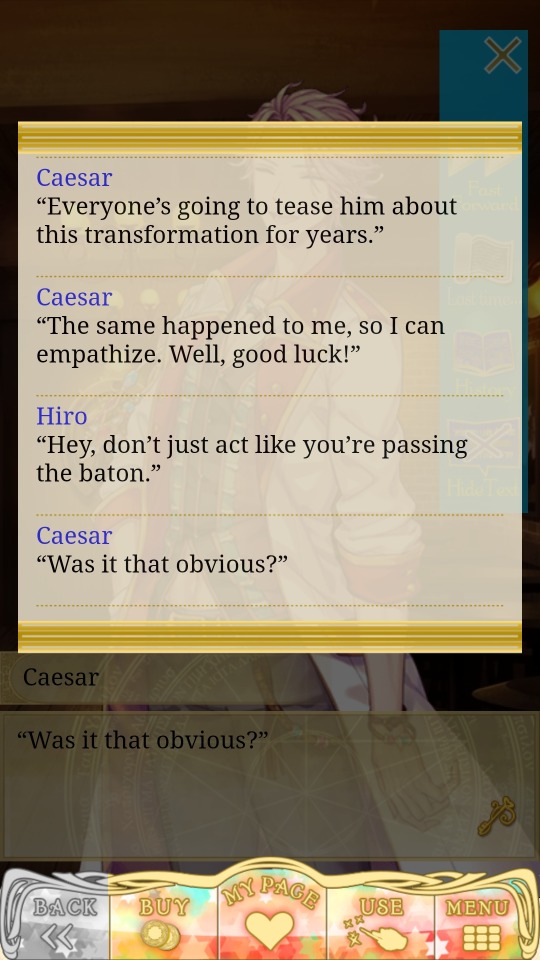
thank you for your services caesar o7
oh! and nox's outfit as nightmare is dumb. i know wh probably wasn't getting the greatest budget in the world but like... could have made it, like, so much better. i'll do a separate post for that in a min.
uhhhhhh i think that's all i got for now. i have . more but y'know. more to come.
#not mcl#wizardess heart#mia plays wizardess heart#mia speaks#[bashes head against the wall] this game haunts my every waking moment#i love the s2 boys so so so much#[BITES NTT SOLMARE] GIVE ME CUSTODY OF THEM. BRING WH BACK YOU COWARDS.
10 notes
·
View notes
Text
“do you love your job?”

(photo by me)
Today, at a family gathering, a relative engaged in a conversation with me, inquiring about updates in my life, particularly regarding my job and achievements.
I explained my daily work routine, expecting the typical response of “That sounds like an interesting job, best of luck!” To my surprise, they asked a question I had rarely encountered in my life.
“Do you love your job?”
I was momentarily silent, and then they continued, “I mean, do you genuinely love what you do, or are you just staying for the paycheck?”
Uncertain about the answer, I replied, “Yeah, I think so,” with my mind still clouded with confusion.
It marked the first time I’d been asked such a question. It left me pondering — do I genuinely love my job? I realized I might be comfortable with it, but I couldn’t discern if it was genuine passion or simply the assurance of a monthly paycheck.
Furthermore, I found myself questioning whether it was acceptable to do my job solely for the money. Did I have to love it? Was it okay if, upon reflection, I discovered I actually despised the job?
In essence, my thoughts distilled into one overarching question: Why do humans need to have jobs?
Answering this question is complex because many individuals don’t have jobs, while jobs have been the traditional means to meet our needs for the past few decades.
For the money, duh.
Let’s face it, to function reasonably in society, some level of expenditure is necessary. It doesn’t have to be excessive, and you can reduce it by living frugally, but I haven’t come across anyone who has mastered the art of leading a decent life without money. Despite their flaws, jobs offer a seemingly dependable and regular income source.
The issue with money can be simplified. It’s a powerful motivator for getting people to work, but nobody enjoys feeling coerced. When we sense external control, our enthusiasm dwindles. Money has the potential to drain our intrinsic motivation for work.
The importance of compensation
We are not intrinsically motivated to work, which is why compensation is necessary. Money can serve as a powerful motivator for diligent effort. In some cases, such as piece rate systems where workers are paid a fixed amount per unit of work, employees may work intensely and take few breaks, sometimes jeopardizing their health. Piece work has been deemed detrimental to health and was banned by unions. Hence, most people worldwide are compensated based on time spent on the job rather than productivity.
While money is a potent means of controlling workers, it’s not the sole reason people go to work, and perhaps not the most crucial one.
There are people who engage in various activities purely for the enjoyment of the activity itself. For instance, anglers love to fish not necessarily for sustenance; many practice catch-and-release, demonstrating undiminished enthusiasm. Motivation theorists term this intrinsic motivation, where the activity itself is the primary driving force.
Something to do
Many individuals don’t utilize their leisure time for creative pursuits. They engage in activities like watching TV, attending sports events, dining out, socializing, or drinking, which are entertaining but may not fulfill a natural drive for accomplishment beyond recreation.
I personally believe that if the constant work-related stress were eliminated, people would discover their own pursuits to work towards. However, for many, it’s easier to simply seek another job.
Contribution to society
Individuals are interconnected with a broader collective. Most people, except sociopaths, share a sense of connection, whether it’s with humanity in general or with a specific culture or nation. Jobs, companies, and governments are conventional methods of organizing people’s endeavors for the betterment of society.
Work can serve as a distraction, whether it’s beneficial or not
In our society, work often becomes an overwhelmingly significant aspect of one’s identity. We begin asking children what they want to “be” from a very early age. Perhaps we should consider asking them what they want to “do for a living” instead. While the phrasing may seem insignificant, the broader point is that investing too much of our identity into our professions can have its drawbacks.
It gives us live purposes…?
Structure is beneficial for many people, and work provides that structure. Even if it doesn’t always feel like you’re saving the world, the routine and organization that work brings into our lives can be genuinely comforting. It can instill a sense of purpose.
The daily interactions at work help us feel essential, and on good days, appreciated. It makes us feel like our talents and skills are contributing to a worthwhile cause. While we might feel needed at home, work offers a unique opportunity to take our training and special skills and apply them to something tangible, which can be highly satisfying.
So… Why are we here? What is the meaning of life, then?
While there may be no definitive answers, that doesn’t deter us from pondering and forming theories. It’s possible that our job plays a role, or perhaps it simply keeps us too occupied to dwell on these questions extensively.
Those are some of the reasons why jobs exist and why many people pursue them. However, it’s important to note that these aspects can be fulfilled through avenues beyond the conventional concept of a job.
Unless you’re fortunate enough to be independently wealthy, you’ll likely need a source of income to cover your expenses. Even if you are financially secure, you may still seek ways to contribute positively to the world or find meaning in life. Jobs are just one of several ways these motivations manifest in society.
So it’s important for humans to work, right?
I believe every human needs to work, whether they love it or not. It’s a necessity, not just a choice.
Life itself entails continuous work and maintenance. To be healthy, maintain relationships, or excel at something, effort is required. Our ancestors, although not working for money, had to hunt, build shelters, and sustain their bonds, among other tasks, to survive. This universal concept of working to survive extends to all living beings.
Now, regarding the question of why humans put so much effort into earning money, it stems from the invention of money to ensure access to necessities and more. Money played a pivotal role in the advancement of our civilization. The monetary system’s key dilemma was ensuring equitable value for everyone participating.
Skills and work varied greatly in value, posing questions about how to provide equal opportunities for all, especially for those unable to work due to age, illness, or disability. Addressing these questions becomes the crux of the issue, as it touches on the essence of human worth and the potential pitfalls of money overshadowing its role as a tool for trade.
Our egoistic desires don’t lead to a happy ending, but there’s a fulfilled life beyond the ego. Recognizing how our ego takes us down a dead-end path prompts us to seek the true meaning of life — an eternal and perfect existence born from our growing awareness.
What if everyone simply went home and stopped working today?
From a social economy perspective, if everyone stopped working, the economy would likely collapse due to a lack of consumer spending and production. Quitting jobs en masse could potentially reveal the true priorities of life, guiding people toward more meaningful pursuits.
Large corporations have significantly influenced our lives, and many have become complacent to this reality. The trend of increasing mergers and acquisitions each year contributes to the growth of these corporations, which is often an inherent aspect of the system.
Many individuals today closely link their life’s purpose to their work. The question arises: how can one disentangle work from purpose? In contemporary times, many strive to infuse more purpose into their work, but perhaps the two are not mutually exclusive concepts.
In the end, it’s about ourselves
Regardless of our profession, our jobs offer insights into both the world and ourselves. Work represents our engagement with the world, as opposed to mere existence within it. The alternative to work can feel unenergetic and passive. Through work, we have the opportunity to shape the world rather than passively accepting its influence.
We can transition from an egoistic approach of satisfying our desires at the expense of others to a new approach where our primary goal in work is to benefit others rather than just ourselves.
The key to uncovering the meaning of life lies in shifting our source of pleasure from within ourselves to the external world. This new perspective connects us deeply with our surroundings, leading to perpetual fulfillment and a sense of perfection and unity.
As social beings, humans depend on each other for survival. Work, often viewed as routine, is a vital element that facilitates interaction, enhancing and sustaining our quality of life.
So do we need to love our job?
While we need money, we often follow our life’s passion and label it as a job or career. Consider this: doesn’t it seem somewhat absurd to wake up each morning for the same repetitive job, receive a paycheck at month-end, and then struggle financially two weeks into the new month?
This cycle repeats for 25–30 years, followed by retirement on a state pension, potentially leading to decades of spiritual emptiness, whether financially secure or not.
So, to avoid a boring old life, consider this:
“Follow your passion, but also cultivate love for what you do.”
Based on the preceding discussion, having a job is vital for individuals, bringing numerous personal and societal benefits. If you love your job, that’s great — you’re focused on one thing. However, even if you don’t love it, as long as it’s not harmful or stripping you of your rights, consider cultivating an appreciation for it.
While also, you can still pursue the things you love. Maybe as a side job, but it’s also perfectly fine if it doesn’t. Anyhow, just find something that will make you feel alive and present and live one time at a moment. What’s crucial is understanding what you do, and with time, you may come to enjoy it with no burden.
#work#passion#career#life#job satisfaction#money#meaning of life#work life#personal#growth#societal impact#passion project#financial stability#self reflection#finding purpose#economic impact#work ethic
1 note
·
View note
Text

APRA signals action for Strata Fund Investments
Last month, the Australian Prudential Regulatory Authority (APRA) has signalled what could be the most significant turning point in Australia’s favourite asset class, property, with news this week that it has mandated a higher interest rate to be used by lending institutions (or ‘serviceability buffer’) when considering mortgage applications for residential home buyers and investors.
This has come about after an astounding 20+% rise in national house prices over the last year, flying in the face of the pundits who predicted severe economic concerns during the pandemic. Given the release of Australia’s two biggest economic states from lengthy lockdowns, it is also quite timely, as they run straight into the usually bubbly spring real estate season.
Whilst it is easy to imagine issues with some sectors of the economy, others have had little impact on their incomes. This cohort appears to be leveraging their unspent overseas holiday and pricey dinner surplus into either upgrading their own home or adding to the collection of investment properties. As debt increases, so does its ability to jeopardise the stability of the banking system.
The lifting of the serviceability buffer is material on several fronts. It decreases the borrowing power of the borrower by around 5%, meaning a decrease of $36,000 on the average Australian home loan of $730,000. More importantly, it also means that the Reserve Bank of Australia (RBA) has, for the foreseeable future, stepped down from its secondary role in moderating house prices (its primary role being to influence unemployment and inflation) and handed the reigns to APRA.
Macroprudential masterclass
The setting of the serviceability buffer this week falls under the broad church of what is called ‘macroprudential regulation’, where more targeted policies are put in force to stabilise and protect various areas of a financial system as required. Whilst the idea of such regulation has been around since the 1970s, the post GFC period is a particular instance where such measures grew in relevance.
This is not the first time we have seen macroprudential policies at work in Australia in the last decade, with other forms, such as limits on debt-to-income levels and caps on lending for investment properties being used in 2014 and limits on interest-only loans in 2017. Both arguably worked (in the absence of comparison, of course) in stabilising and slowing high levels of lending to this cohort of borrowers.
The interesting part this time around is the focus on the actual lending rate itself (now fixed at 3%) instead of previous attempts, such as capping investment interest-only lending to 10%, like in 2017. This tells us that APRA’s view is twofold, interest rates are likely to either remain at present record low levels or potentially fall further, and now a synthetic constraint needs to be applied to arrest the ballooning household debt issue. It also reveals that the problem is overarching across the whole property sector, not just those pesky investors pushing up prices.
Central bank limitations
It is safe to say that the RBA has had its hands full over the last couple of years. That might be an understatement. The enormity and severity of the pandemic’s effects on Australian incomes (in aggregate) are challenging to plan for, even with the skills and experience possessed by the entity at the core of the Australian financial system.
On the one hand, it is reasonable to affect the dramatic drop in interest rates to lessen the debt serviceability costs on the economy. This helped by diverting these savings into gaps in revenue and income caused by lockdowns and temporary business closures. It appears to have worked well in conjunction with record fiscal (government) stimulus measures to both households and businesses.
The knock-on effect is, of course, that many Australians, mainly white-collar workers and businesses, have seen little impact to their incomes and revenues as they soldiered on from their kitchens, benches and settees. In fact, for many, the broad and immediate stimulus measures have meant a rise in revenues and wage increases, along with higher profitability from cost savings (think downsizing offices) and increased productivity (longer work hours from home without the drag of commuting).
This surplus, unsurprisingly, has to lead to higher asset prices, both powering the dramatic reversal of the sharemarket falls in March 2020 and the ability to lever up savings when considering a house purchase. As house prices have risen, so has borrowing levels, with 20% of new loans in the June quarter borrowing more than six times their pretax income. Clearly, something needed to be done.
This is where the job of the RBA now bifurcates, as its primary mandate of targeting low unemployment and controlling high inflation conflicts with the runaway asset price bubble it has created. New measures need to be put in place, and so we see APRA having to move in.
What lies ahead for strata fund investments
We are not going back, not to historic mortgage rates, not to ‘reasonable’ rates of return on cash and other instruments like term deposits and not to the way it was.
This week’s return to macroprudential policy marks what could be the next chapter in Australian financial management at the highest level. A new paradigm of record low (or even negative) rates to help ensure stability for Australian financial institutions and their margins has been, at least for now, locked in by enforcing controls at the mortgage shop floor rather than the supply line in preparation for a prolonged period of near-zero rates.
So now the question remains, how much longer can Australian savers accept the near-zero returns on long term capital? New strategies will need to be adopted to ensure that the impacts of the pandemic and its lasting effects on local and global investment returns are mitigated for the foreseeable future.
As a lot owner, financial controller or just strata committee member, there has never been a more appropriate time to reflect upon the investment plans for your long term capital works, maintenance, reserve or sinking funds. With the advent of protracted low returns (or even negative returns once inflation has been taken into account) from cash and term deposit investments, it is high time to consider any alternatives.Strata Guardian is here to help. We have recognised this issue for a long time and prepared a series of portfolios directly targeting the needs of the Australian Strata Community. Get in touch, book a callback or send us an email to start the discussion on how we can help you now.
0 notes
Text
My problem with 2017 MSM’s Harry and Peter (Spoilers ahead)
As much as I’m constantly praising MSM for their portrayal of Peter and Harry’s relationship, I do have one major issue with the show in the context of Peter and Harry (and many more in the grand scheme of the show if I disregard the platonic and romantic parksborn content). There is a huge lack of payoff. Let me explain:
The show hinted that Harry may have been sick like his mother, or at the very least, he was struggling with his health. All of his energy would occasionally, suddenly drain, and Harry would pass out. The show used this as a plot device, but once season 1 was over, it was forgotten, brushed aside as Harry not adjusting to the superhero lifestyle. But this was a throw-away line that Harry used to keep Peter from worrying, those symptoms were extremely concerning and would have made for a great storyline.
There are two storylines I could see happening, the first one is the shortest of the two. If the showrunners wanted to keep the plot short, they could have explained this through Norman. Norman was using Harry’s ill health to manipulate and gaslight him, therefor, it wouldn’t be illogical to place the blame on him. While a dark idea, it could have been possible that Norman was drugging his son to worsen his health for the reasons just listed. This would have, not only, explained what I view as a major hole in the storytelling, but also added to the overarching plot of Norman being a terrible father and a terrible person.
The second possible fix that I can think of, simply off the top of my head, is the one with the most emotional payoff. If the show had waited, if they had kept the storyline going throughout the seasons, it would have given us so much payoff when they finally decided to address it.
The first season of any show is the basic blueprint for what the entire show should be at it’s core; therefor, from that blueprint, we learned to expect Harry to be a staple. The first season was not a story about Peter Parker, not even Spiderman. The show was about Peter Parker and Harry Osborn, both together and separately, it was about their journeys and how life continued to bring them together. In season 2, the show threw Harry aside the moment they were done with the big bad’s storyline, his father’s storyline. He simply disappeared to “Europe” for half a season, no explanation for his ailment. While I don’t necessarily hate this concept, many people, including myself, isolate during rough emotional times, he should have never been forgotten.
If the show wanted Harry to isolate to continue his father’s work, they should have shown us that. We didn’t need a mid-season reveal. I felt that that took away from the show immensely. Personally, I’ve seen Spiderman tv shows, and MSM is nothing special there. What drew me to the show was the depth that they gave the supporting characters. I exclusively watch the episodes with Harry Osborn, because I’ve seen Spiderman before, I haven’t seen Harry Osborn like this. The show should have continued Harry’s storyline separate from Peter, that way, the emotional payoff, when Harry’s actions and motives are finally revealed to Peter instead of the audience, would have been intense.
Finally, if the show wanted to pit Harry against Peter in a major showdown at the end of the show, (obviously keeping Harry redeemable, because we all stan a hurt but not evil Harry Osborn) it would have been the first on-screen adaptation of their relationship to truly, successfully, pull the green goblin storyline off. Raimi-verse did it well, but MSM could have done it perfectly if they set themselves up for it.
At the end of the show, Peter could learn that Harry has been sick, and with the seasons of setup, it would have been heartbreaking. The reveal would be the thing that enables Peter to understand where Harry’s motives have been, and it would be the thing that could save him from the dark path he was going down.
Even if the show wanted to avoid any more Harry-Peter conflict, it would have been gut-wrenching to discover after seasons of build-up that Harry has been secretly sick, even if the ailment isn’t life-threatening and only life-altering.
The moral of this story is, the show needed more consistency and a larger, more long-term plan for the show, because the best shows, regardless of the target audience, are the shows that plan their entire series out and don’t leave plotlines hanging with no explicit or implied explanations. Avatar the Last Airbender is the perfect example of a kid’s show that will remain legendary because of the consistent and thoroughly developed and explored plot.
36 notes
·
View notes
Text
The Ways in Which Hyejin Moves Forward and Dusik Steps Back
The spotlight is often on Hyejin and how she keeps drawing lines in her relationships with others, but what is also narratively noteworthy is that even though Dusik rebukes Hyejin for stepping back (and her seeming lack of compassion because of her sometimes biting or harsh words), it's the very same habits he criticizes her for are also often the same ones he engages in with her as well. But since he does it with an air of hapless helpfulness, he's easily forgiven, or not seen as prickly as her own defensiveness.
Dusik tells Hyejin to cross lines freely, yot always keeps his own boundaries in all his relationships with people. He accuses her of being narrow-minded in how she deals with people, yet he is always trying to tell her to do this the way he thinks is best (and his way of doing things is not always the best! For example, Hyejin was correct about giving Juri space away from her dad for the night). For all the times that he has admonished Hyejin for drawing the line when lines aren't necessary, he takes just as many steps back when she moves forward. Of course, she is obviously emotionally guarded as well, but she does have the courage to take the lead when it comes to her feelings. It's only when Dusik doesn't meet her back halfway that she falls back as well and has her own bluster about lines and boundaries that should not be crossed. She is reacting to his own guardedness in kind.
Another thing Dusik says is that one should be direct and "apologize for spilling milk rather than avoiding [the people it affected]," yet he deflects and comes up with (*ahem* the dumbest) excuses as to why he lied to Hyejin about their kiss. For all his bluster, he too, is used to creating space and distance between him and other people. He may be capable in many ways of practicality and usefulness, and he may be the person who other people turn to when they need help or are in trouble, and he may be the go-to person to fix any issue someone else has, but the issue he needs to learn to fix the most is his fear of his own vulnerability. And the first step to doing that is getting over his own mental block of allowing someone into his life where he might want to rely on someone else as much as they can rely on him.
Dusik's most overarching dichotomy is how wants to be a savior but cannot accept the possibility of being saved himself. He is incredibly uncomfortable when he is the one being taken care of and being put in the position of being reached toward rather than him being the one reaching forward. If he reaches forward first then he can set the parameters and maintain control of the situation. He has the control to draw back whenever he wants rather than being at the mercy of the whims and desires of another person. Since he can only control himself, he only wants to rely on himself. We see Hyejin reach forward over and over again, but the power dynamic in which she reaches forward has changed as well, as she goes from being someone that needs him (when she first showed up to town and needed help), to someone that wants to spend time with him (looking for him, creating situations to see each other and spend time together), to someone that requires more of him (needs him to verbally recognize his attraction to her), and because she is the one trying to move things along then that is where Dusik starts to falter in response. She's not just reaching forward, she's pushing.
Hyejin is the one that directly confronts their feelings and asks if he likes her, she's the one that kisses first, she's the one who presumably moves from the bed during their drunken night to be next to him (hence why she did not have her own pillow on the floor). Even when she literally reaches forward to wipe the sauce off his mouth, he is taken aback and uncomfortable. Not that she did anything wrong, but he has a complex about being taken care of. He'd rather pull every relationship back into transactional territory as a way of keeping himself from looking (being?) too emotionally attached than admit emotional dependence in any way. If everything he does is a favor or has a price or is transactional in any way, then he can live in his self-reliant fantasy. He obviously does harbor a lot of feelings because he is often passionate despite his clear desire to maintain a cool outer demeanor, but it's not something he wants the world to see. It's his main defense mechanism--to separate himself from others and deny any deeper feelines that can't be explained away with whimsicality.
If Dusik keeps himself from being too attached to anyone else then he can live in denial forever never recognizing his loneliness or acknowledging the fledgling desire for anything more. Again, he has this compulsion to be the one that is needed, and not to be the one that needs. Companionship, equality, dependence--they scare him. He wants to be an island of one, creating his own ecosystem of reliability, providing anything he might need for himself. But a healthy ecosystem cannot thrive without the symbiosis that others provide. A person needs real, reciprocal relationships to survive, but Dusik is in deep denial about that. So he creates artificial distance between him and other people.
And not only does he create these distances, he also creates unequal footing between them. Obviously, this is visually illustrated by Dusik catching both Hyejin and Sunghyun from falling, but also how he carried the grandma on his back when she hurt her ankle, and even how he usually wears an apron when he goes to the café so as to literally illustrate how he is hired to be there, even though not even the owner wears an apron while working. Dusik instinctually creates this separation as a way to shield himself from emotional attachment. Now, does this work? Of course not! He is absolutely completely emotionally attached to everyone in Gongjin and also already to Hyejin. You can see it in how he always shows up to help even beyond the parameters he sets, how he runs to the dental clinic when he hears about the creep, how he finds ways to help Hyejin make up with the townspeople, how he jumps on stage as an impromptu backup dancer with her. Being smitten isn't enough. He wants to believe it is enough. He wants to believe treading water and pretending icy exteriors don't exist is the key to a happy life. But both Hyejin and Dusik's subconsciouses are demanding more from their relationship with each other.
But for now, Dusik is asking for more of Hyejin than he is willing to put up himself. She may be hesitant, but she is trying. And she is actually so brave! She may be prickly like a hedgehog at first, but she DOES take people in. She steps outside her emotional bubble over and over again. She opens her home to Miseon and has her move in with her, she takes in the kids the hedgehog when they ask her for help, she has a very personal conversation with Juri and relates to Juri (and learns from Juri as well! She is not so snobby as to not learn an emotional lesson from a child) when Juri runs away from home. These are all things that Dusik would not do. He insists on living alone, he says he does not take care of living things, and he wanted to drag Juri home right away without listening to her. Yes, these examples above illustrate how he and Hyejin differ, but also show how he has his own ways of keeping himself closed off.
However, what this episode ilustrated the most was that human connections are important, and how forging those bonds and nurturing those bonds make one's life vastly more fulfilling. Every instance where someone faced a situation alone was greatly improved by the support of others around them. The entirety of the concert had people in the community hyping the people on stage and making the performances more fulfilling in doing so. And then once again someone was saved from falling onto the rocks, but this time it was Dusik being saved. Even the doesn't want to, he is going to have to face being vulnerable and a person that reaches forward not just to help someone else, but who has to reach forward for help in order to move forward in his own life.
#hometown cha cha cha#kdrama#meta#my meta#homcha meta#once again i am asking you to consider that hyejin is fucking fantastic#and also dusik is not all perfect either#also it's bc they are both imperfect which is why their story and how they are coming together is so compelling!
85 notes
·
View notes
Text
For today’s ‘i really, really love kang yohan’ post, we’re gonna be develing into a little bit of emotional intelligence and the fact that Yohan both possesses it while simultaneously doesn’t, lmao.
Yohan is portrayed as a hunter and a shark. He’s said this himself in his own words. He’s read up on dynamics of humans and instincts and basis himself off of a monster for a couple of different reasons, but the main one being the fact that people believed him to be as such instead of coming down to his level as a child to understand him.
This by far, means Yohan was emotionally neglected (physically too, but that’s, in some ways, addressed in my other meta post) by parental figures in his life except for the nanny, possibly, on occasion, and isaac - but even then, we know it must’ve only been to a certain extent. On top of that, yohan’s only true witness to emotions is through those people in the house, and needless to say, one of them was off the walls abusive.
It’s why we get scenes like the choking one because when Yohan is angry, guess how he’s learned to express that? It’s physical, but it ties in emotionally. Yohan lashes out the only way he knows how, but this is also an indicator that he’s lied about being a monster. Why? Because people with extreme reactions to emotionally charged questions (like your associate judge accusing you of killing your brother, for example) can often mean that it’s more than just a sensitive topic; it actually matters to that person. At this point, gaon does not know isaac’s story, but we later learn yohan’s version of the fire, and it’s slowly revealed through Elijah, specifically, just how much family is a tough topic for Yohan.
And fortunately, gaon sees right through yohan’s bullshit when he calls him out about how he should be a victim, not a monster. Which opens up the door to us understanding why Yohan does what he does and says what he says even more because it’s revealed through that conversation that these are specific words Yohan has heard before. So not only has he been emotionally stunted as a child by way of abuse, he’s had so many people in his life look at him as a callous monster. And when that happens, don’t you start to believe it? Don’t you lose a little bit of your humanity and become the very thing people say you are?
However, this is also yohan’s strength in the world he lives in, especially with the intent to seek revenge for Isaac. He can put his emotions aside and think clearly, even in situations that should rile him up. You can actually see him get… amused when someone tries to put him in a corner. Yohan doesn’t rely on emotions because it’s logic, rational and strategy that gets him every single checkmate. It’s what’s got him to the point he’s at now. It’s how he’s able to push gaon into seeing reason because if you look at things from the perspective of philosophy and science (by way of human nature), it becomes easier to see a path and a plan so very clearly to whatever outcome you’re wanting.
The issue that comes into play circles back around with family. Because Yohan did not grow up in a healthy environment, he doesn’t know what family actually means and what dynamic it should look like. The past several years he’s spent with Elijah, he’s lived it logically because it means keeping her safe without taking into consideration the fact that Elijah is not like himself and did not grow up in the same environment he did. Only, Yohan also has a habit of not telling anyone his plans, and that’s where the miscommunication starts. How is Elijah to know why Yohan keeps her away from the world? It’s revealed she’s been kidnapped twice, but does Elijah truly understand yohan’s perspective? No, she’s a teenager, and gaon was right about it not being fair to keep her locked away.
But I digress. Here you have a man with a plan with repressed emotions and then enter one kim gaon, and he’s asked for trouble. One of the reasons Yohan, I believe, has kept gaon around is because he defies the typical. He challenges Yohan, not in an act of dominance, but out of another way of thinking, and that’s a big difference. Things might go over gaon’s head, and he’s not always right, but he’s looking at all perspectives, even if they’re wrong. Multiple times Yohan has been surprised by gaon’s way of thinking. That’s intriguing and it’s different.
Which lead to situations where gaon’s confronting Yohan about himself, holding up a mirror and asking him if that’s truly who he is or if it’s someone he’s trying to be, if he’s listening to what other people have told him or if he’s actually listening to himself. Which is kind of ironic with Yohan only being able to trust himself, but he can’t even do that, can he? He lies to himself in order not to face what he truly feels. And that’s because it’s filled with pain, and Yohan doesn’t have time for that.
But there is also a reason why a lot of his progress takes place in his house and away from the world because a home is meant for vulnerability and while Yohan and Elijah haven’t had that in a while, Yohan didn’t take into account gaon’s ability to see things differently. Yohan saw gaon’s mind for his plan and for the overarching plot to oust the rich, but what he did not consider is how that would translate into his personal life. Which is hilarious because Yohan is the one that brought gaon into his home in the first place and ultimately ended up with a surprise of a man who’s clearly moved in because Yohan never tells him he has to leave.
So, that’s where things begin to unravel. Gaon tests Yohan’s patience and emotions in ways he hasn’t been tested. Again, gaon’s held up the mirror and asked him to consider looking deeper for the actual truth instead of the façade Yohan lets himself believe is real. Gaon is also one of the only other people in yohan’s life that has actually considered yohan’s feelings and, in turn, elijah’s. gaon is also a man of righteousness and it makes sense that he’s not afraid to share parts of himself if it means it’s doing something good.
We see this particularly with Elijah, telling her about his parents, not reprimanding her over her murder plot, lmao. gaon grew up in an emotionally healthy, and most likely, happy household where he could express himself without feeling like a burden. He has patience and kindness imbedded into his being.
So with that dynamic of being in a home where people are not on display in front of the world, with gaon’s ability to emotionally connect with people, and finding out the looming secrets of the kang household, it becomes rife with opportunity to peel back those layers and expose them for what they are and talk about it and instead of hiding it away in the shadows. Gaon gives them all space to have those emotions, and while he prods and he asks questions, it’s generally in the form of a gentle reminder that other perspectives exists than the ones that are within those four walls. Gaon doesn’t get angry necessarily, and he apologizes when he’s wrong. His straightforwardness and heart-on-his-sleeve demeanor actually works in his favor, albeit a bit misguided at times.
And with all of this, it’s how Yohan slowly begins to open up. Gaon might be accusatory from his distrust of Yohan, but it’s from a place of curiosity and determination to understand, ultimately, rather than a motive of punishment. I think gaon connecting with Elijah is also the icing on the cake and driving motivator that yohan made a good choice in keeping gaon around because Yohan notices the change in his niece and how much happier she is. Gaon’s directly pointed fingers at Yohan and he’s spied on him, but he’s also confronted Yohan about what he’s done head on without taking justice into his own hands. So with those two things combined (helping elijah and wanting understanding), and even yohan’s determination to get gaon on his side, means that level of trust has slowly, but surely, grown into something much more than Yohan ever thought it could be.
Because again, Yohan did not think about the intricacies of living with other people at home and how well you get to know them by merely existing under the same roof. Gaon learns little things about Yohan and doesn’t use them to his advantage or as a slight – maybe in the beginning with the spying, if we want to give him any credit at all for that. Gaon sees a problem and tries to fix it – just like he sees a problem with the world and with corruption and uses the justice system to fix it.
With all of that understanding and poking and prodding, gaon learns how much Yohan cares for Isaac and for Elijah and validates those emotions while still giving Yohan a slap on the wrist for how he’s expressed that care. He learns of yohan’s abuse and confirmed and supported the idea of being a victim and how that’s okay, that Yohan needs to learn to accept it for himself in order to truly heal. He’s berated Yohan for not showing more kindness to Elijah, the only family he has left and just how important that bond is, after discovering what Elijah means to Yohan.
And that’s given Yohan agency with his own emotions. He’s cried over the memory of his father abusing him and wishing he could’ve stopped it. He’s admitted that he hates when gaon looks at him like he’s a monster, and he definitely hates it when gaon makes assumptions and dives in head first without actually thinking things through. But that is also an advantage of Yohan: understanding someone emotionally because it means that Yohan has learned so much about gaon and the way he thinks that when in episode 9 he tells gaon about how he reminds him of Isaac with his assumptions, it comes from a place of discussion rather than anger. He’s realized the way to get through to gaon is through talking and physically showing gaon how he thinks (the prison reveal). Granted, he’s been doing this with gaon since the beginning, but it’s become even more pertinent now.
The thing is, Yohan has recognized gaon’s kindness at this point. He’s witnessed it in his misguided understanding of the justice system. But what’s truly interesting is that Yohan understands gaon’s kindness, but he still doesn’t understand the world’s. Yohan has a very different perspective of what kindness looks like because it’s not actual kindness but motivation and ulterior motives. Kindness to Yohan is power play – it’s people using others by any means necessary to get a leg up. It’s self-serving for their own benefit and not for others.
Which is also how that first seed of trust is planted with gaon – when he saved the little girl and the bus driver. And how more seeds are trusted by way of gaon doing what gaon does best – provoking Yohan with different thoughts, especially when it comes to family.
But this also applies to yohan’s understanding and hypocrisy when it comes to Elijah and kindness. At this point and by episode 9, Yohan has accepted gaon’s kindness. He’s let it in, lets Elijah indulge in it because he’s noticed that their home is happier – by way of making gaon come back because Elijah missed him. Yohan believes Elijah naïve for trusting others who show her any ounce of kindness, but the thing is, Yohan has come to trust gaon. He’s witnessed the kindness and the understanding, and yet it’s much easier to continue believing that it’s actually a cruel and ugly thing, especially in the wake of Elijah getting hurt, and that’s his default method of coping. Kindness got Elijah hurt and in trouble. It’s what makes you weak.
And if there is one thing we know about Yohan is that he’s anything but weak, but it’s another lie. Kindness did not get Yohan anywhere in life. Kindness got his brother murdered and his family taken away from him.
But the saving grace from that way of thinking? Gaon, yet again, telling Yohan why he’s wrong. Gaon tells Yohan every human needs someone to rely on as long as they’re human, and I think that was certainly a pain point of remembrance in how Yohan had no one but Isaac and then no one after. only this time, a point is made by way of Elijah because she only has Yohan now and she, unlike what Yohan convinces himself he doesn’t need, actually wants to experience human nature – that innate thing kang Yohan has so desperately read about and studied without taking into consideration that the carnal desires of humanity don’t always outweigh the good found within.
And isn’t that just a little bit ironic how someone so capable of understanding the human psyche cannot simply recognize kindness when it’s so freely given? If he weren’t the skeptic and the hypocrite, maybe he’d see what’s right before his eyes, and maybe he’d see just how far he’s come in allowing someone to see parts of himself he’d always been led to believe didn’t matter.
Kang Yohan is a complex character, but he has so much room for growth, and it’s exciting witnessing that in baby steps – and that’s all because he couldn’t tell his doe-eyed associate judge no. sucks for Yohan, I guess; getting himself into a mess he cannot get himself out of, an issue of his own doing and one we very clearly have seen he doesn’t want to rectify, lmao.
also one more thing..... that dinner scene in ep 9 is also a true testament of what can be done with just a little provocation because there you have yohan realizeing what a happy home can look like if he just tries to be more vulnerable and that it actually, in fact, does matter.
#x#*#kang yohan#the devil judge#look who write 2.3k about yohan bc im a dumbass and just spit out thoughts#this is not in order at all this is me rambling like the dumb b that i am#god i love yohan so much wow i hope this makes sense bc yikes#this is what happens when u have a lot of thoughts and there's so many components s#even after all this i know ive missed some but lmaooo here is this#does any of this make sense i hope it makes sense bc i dont feel like it's fleshed out how i wanted it#nor is it in order but uh yeah food for thought yall!!!!!!!!
76 notes
·
View notes
Note
One thing that pisses me off not just about the miraculous fandom but modern fandoms is fans inability to consume long overarching stories.
Like so many people are complaining about how long the reveal is taking or why haven't certain characters outgrown this trait yet or why is this character arc botched or abandoned. Like guys we just got the confirmation this show will be 7 seasons long PLUS like 3 tv specials. We're only roughly halfway through the series.
Once the reveal happens half the tension in the show is gone! I'm not saying leave the reveal till season 7 and make us wait 9 years this isn't HIMYM but miraculous is not a fast paced story. It's a long haul story. I just wish more fans would be patient. Miraculous is in the extremely fortunate and rare position that it will have a conclusive end and not be suddenly cancelled. That was and still is a huge problem for shows and cartoons with dedicated fans but networks pull the plug for stupid ass reasons.
So miraculous fans please chill the fuck out on things not resolving right away. We still have 78+ episodes plus the tv specials. If we get the end to certain things now it'll be so boring.
I think the concept of Instant Gratification describes the issue with many modern fandoms today. I hate to sound like I'm anti-technology, but the constant stream of quick and short bursts of entertainment allowed by the information age has made people more impatient. It's not about waiting for the climax to get a deeper sense of satisfaction, it's about getting that instant gratification right this instant. It's why one-shot fanfics are all over the place, when multi-chapter stories used to be just as common and popular, if not even more so, and it’s also why people are less willing to read a fic that’s still a work in progress. It's why people refuse to watch Youtube video essays even as they leave comments on the topic based on the title and thumbnail alone because, while they couldn't be assed to watch a 20-minute video (let alone an hour long one), they sure can spend that time calling the Youtuber names and making arguments the video actually already refutes. It's why a lot of online arguments happen only because one party read nothing but the first and maybe the last paragraph of someone's post and skipped all the explanation for their point of view (if I've ignored an counter argument for one of my posts, it was either because I missed it or because said counter argument did this. I have attention deficit issues so I do genuinely forget responses sometimes, but I'm also not writing a second essay for someone who's proven to me they won't read it).
Of course, it's only by constantly consuming only fast-paced content that you can become this impatient. People have different ideas about stories based on what stories they have encountered in the past.
Another thing that influences the Miraculous fandom in particular is that, while I love to show off exactly how much Miraculous has done to build up the overarching plotlines, Miraculous isn't really a show that's about a single story. It's easy to understand why people think it is one though: there's one main villain, we keep discovering more about the mythology, one of the main plot threads is the romantic relationship between the leads and singular episodes and plot elements tend to get payoff later. What is the purpose of a show if not to progress the story? Because the heroes aren't getting closer to defeating Gabriel or getting together, people think that the story isn't accomplishing anything.
I'll do a comparison to illustrate why these things aren't as clear-cut signs of a continuous storyline as people think. In the Spider-Man comics, you can pick any issue up and the chances are that the villain will be a part of Spider-Man's already established Rogues Gallery, who's back for more after who knows how many defeats, and those past defeats might even get referenced in callbacks to previous issues. It's also very possible that Peter and Mary Jane's relationship is the central focus with them not being together yet, having relationship problems or even having broken up (in really old issues the girl might be Gwen Stacy and short-term options have also always been available for romantic entanglements). Does this mean Spider-Man is a continuous story where the only point is that all the villains get put away for good and Peter and MJ live happily ever after? No, it doesn't. Spider-Man is designed to go on indefinitely, so there's no clear ending point. So, what is the point of Spider-Man then, if there is no Ending?
It used to be the single issue, because comic books used to have every issue be a stand-alone story about the hero and their supportive cast. These days it's more every three-to-six issues, because superhero comics are written to have short story arcs that can then be collected into trade paperbacks. A superhero series is not a single story; it's a series that functions as a story engine, meaning the series can generate several shorter stories where the hero helps fix a problem or solve a mystery.
In the superhero genre a villain will never get killed off or removed from stories permanently as long as the writers think they can still come up with stories to tell about them. The hero's romantic life will never be completely smooth sailing unless the writer is using other things to ramp up the stakes. Everything always allows for there to be another adventure.
I think the huge success of Avatar: the Last Airbender made people think that a series that is a single story is always superior to a series with multiple shorter plots. When I was liveblogging Sailor Moon, a viewer offered to give me a list of all the non-filler episodes because they genuinely thought I'd feel like I was wasting time on the show otherwise. This attitude is simply not based on fact. It's not fair to compare Miraculous Ladybug to Avatar, because they're both setting up to do completely different things. Miraculous Ladybug is trying to become a brand, like Batman or Spider-Man. It is part of the "Zag Heroes" lineup, a series of French-created superhero franchises to compete in the America-centric superhero market. This challenge is good for the genre, because Marvel and DC have started resembling each other more and more as these companies stew in their old ideas and copy everything that worked for the other one. The superhero genre needs new blood.
Also, Avatar: the Last Airbender first became popular by doing episodic plots for almost the entirety of the first season because it's actually not a wise choice to expect the audience to be willing to commit to a story that'll only give payoff later when working with an untested IP. Very often shows with longer story arcs start with the episodic format to hook people first, and sometimes the more linear plot is introduced specifically because the audience for the show is now expected to be both dedicated enough and older and capable of keeping up. Because, here's the thing: you can't expect little kids to remember every episode or even every character you've introduced in your show. I'm not sure if people are ready to hear that but I'm throwing it out there anyway. Kids are not dumb, they can understand more complex storylines, but many kids are still training their memory, so they might not remember the details of complex storylines that go on for too long.
This is why the news that Miraculous Ladybug's fourth season was going to have a recommended viewing order originally had me concerned. Miraculous is being branded for kids. The plot requiring too much skill in memorizing story details will make it less accessible to kids and might put those two additional seasons at risk. However, it seems that the "constantly changing status quo" concept of Truth, Lies and Gang of Secrets was a fluke and the evolution of the show is more subtle, so they might not be cutting the amount of episodes for those final seasons because the show is getting too complicated for kids to follow all the important details.
Regardless, Miraculous Ladybug being an adventure cartoon TV show instead of a comic book or a more cheaper-to-produce TV drama does mean that Miraculous Ladybug isn’t expected to go on for decades like a superhero comic or a soap opera. Because of this, it can have evolution and changes and even a planned ending. The show is expected to end at some point, even by the people making money off of it, mostly because making a cartoon like this indefinitely costs a lot of money, and kids’ adventure shows tend to see a decrease in returns if they go on for too long.
#media and fandom response#ml fandom salt#miraculous ladybug#miraculous tales of ladybug and chat noir
53 notes
·
View notes
Text
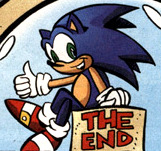
And so that’s it... nearly 200 issues deep, we’re done with the contributions of original writer Michael Gallagher. I’ve been asked in the past about the possibility of writing an article going over Gallagher’s run, like what I did with Penders. And I might still do that. But for now, here’s a shorter postmortem summarizing my feelings on the work of the original writer for history’s longest-running video game comic
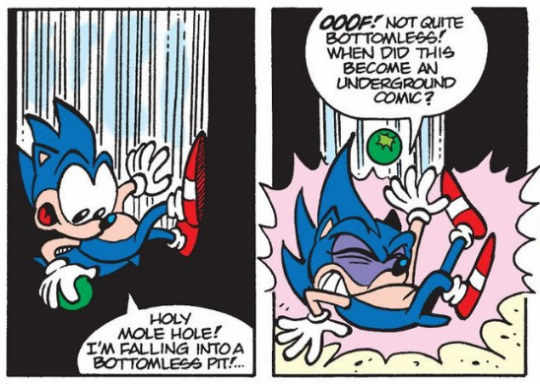
I think it’s easy to look back on Gallagher’s silly old stories with a lot of nostalgia, especially after seeing what the series would become in its Dark Age. I can’t blame anyone who feels this way. I feel that way sometimes, too. It was a simpler time, with short, self-contained stories and a ton of puns, and it was a lot more easily digestible than a lot of the teen melodrama and half-baked sci-fi that followed. But the thing is... that doesn’t mean that Gallagher’s writing was good
Gallagher was always an odd fit for Sonic. I can’t really blame the man for introducing lame concepts like Cal and Al that didn’t fit in with Sonic early on because it’s not like he had much to work with in the early days. The guy was expected to write a monthly comic series based on a couple 16-bit platformers with very little story and some snippets from a cartoon that wasn’t out yet. He also had no way of knowing that his work here would lay the foundation for the longest video game comic ever made. I don’t envy his job. Of course he’d do a goofball story where Sonic travels back to caveman times. It’s not like he had much else to do
But as the series progressed and the cartoons and games gave the comic writers more material to work with, Gallagher didn’t really play along. He gave us a few solid, fun stories like Mecha Madness, but for the most part he was off in his own world, trying to sell us on shoehorned characters like the Forty Fathom Freedom Fighters or the Downunda Freedom Fighters who existed almost exclusively to deliver new flavors of lame pun. One time he even worked with Jim Valentino to make a naval-gazing parody of classic Guardians of the Galaxy so they could make lame puns about a comic they used to write (that very few children in 2001 reading Archie Sonic would be familiar with)
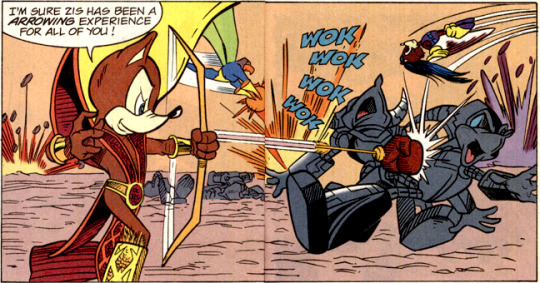
People generally pinpoint Penders as the guy who became obsessed with his own pet characters over the main cast as time went on, but really, Gallagher was just as guilty. And honestly, sometimes Gallagher doing it bugged me more. At least Penders had some prominent characters people actually liked, like Elias, Lara-Su, and Julie-Su, as well as some semblance of an overarching plot to work with. Meanwhile Gallagher was over here trying desperately to get people to care about a group of characters he had created exclusively as a vehicle for trite Australia jokes
Gallagher did introduce a few characters who stuck around, but he doesn’t really deserve much of the credit for that. Most notable would probably be Fiona Fox, who would become a major recurring character under later writers... except Gallagher only really invented her robotic doppelganger that Robotnik tricked Tails into falling in love with that one time. He created Knuckles’ grandfather Athair, the one comic character to somehow make it into a cartoon, but Penders helped out with that lore and did more with the character, meaning most people just assume he’s another Penders echidna. He created Tails’ parents, but Karl and Ian were the ones who actually did stuff with them. And he created the Ancient Walkers, who were kind of neat at first but quickly devolved into a tired plot device, only to be killed off by Ian almost immediately to cut down on the deus ex machinas. If you look at the list of characters Gallagher created, it’s mostly just randos he created for the sake of puns
And that’s really what most of it comes down to. Lame puns. I’m totally down for Sonic stories that go for a silly tone. I love Sonic Boom as much as the next fan, and I’ve been having a blast with the extremely goofy Sonic X comics. I’m not a cartoon snob who won’t watch a show that doesn’t have action and drama and lore, I’m out here watching shows like Apple & Onion. But while Gallagher could write good jokes sometimes, he mostly relied on groanworthy newspaper strip-level puns. (I guess it’s fitting, considering he’s related to both the guy who created Heathcliff AND his successor who makes those comics about the Garbage Ape.) I love me a good pun from time to time, and a lot of Gallagher’s are funnier when shared out of context, but when a story is just wall to wall puns it becomes agonizing. Puns should be a spice, not a main ingredient. And when Gallagher got a chance to follow an ACTUAL newspaper comic strip format in the Off Panel, he fared even worse. It was so rare for the Off Panels he wrote to actually be any funny
He WAS genuinely funny at times, though. I’ll give him credit for that. I don’t want it to seem like I hated ALL of his stories. (He did impress me with at least one political joke that’s sadly still relevant today, and in hindsight there’s something really funny on a meta level about the dark and gritty return of Cal and Al.) I think his best work came when he was paired with better artists. Scott Shaw’s more energetic Sonics really helped sell the cartoony comedy in the original miniseries, and obviously Spaziante’s work on Mecha Madness made that story legendary. When he was stuck with the less exciting Manak or Mawhinney, though, not so much
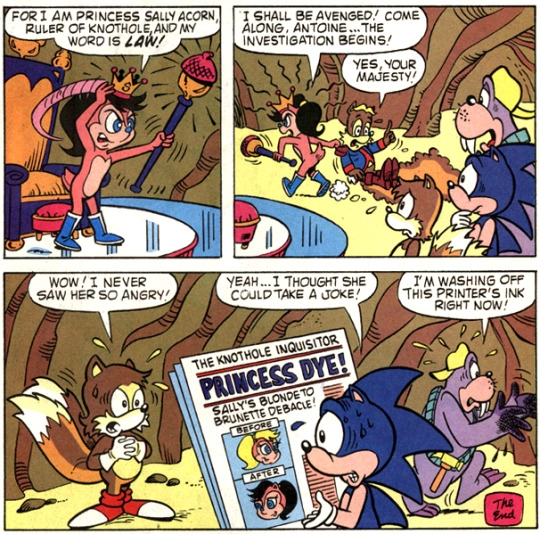
Beyond the puns, there was also this undercurrent of nastiness, meanness, and general grossness in his stories that I don’t see as many fans pick up on. This was mainly evident in the many odd decisions he made with the female cast
We had his take on Sally, who was treated as little more than Sonic’s annoying, moody, bossy girlfriend who bickered with him, sat on a big throne, and occasionally got to be a damsel in distress. He added Bunnie to the cast early on, but it felt like he didn’t have many ideas for what to do with her except make her the butt of jokes about her being a southern belle, including literally making her say “the South shall rise again!” We had Barby Koala’s extremely creepy flirting with Tails, who was half her age. We had that tone deaf Off-Panel joke about turning the special dedicated to the female readers into a swimsuit special (which isn’t far off from what everyone else actually did). And we also had that baffling story where Dulcy killed her mother. I have NO idea what the fuck he thought he was going for with that one.
It wasn’t just the girls, though--Antoine was somehow even more of a punching bag in Gallagher’s early stories than he was on SatAM. At least in the cartoon Sonic was responding to Antoine’s’ massive ego when he poked fun at him. In the early comics, Sonic would constantly rag on Antoine at any opportunity he got. It was VERY distracting in the early issues, and it made his Sonic come off as way more of a jerk
Later writers would often talk about needing to fix certain characters. Penders, for all his countless insufferable faults, used his early stories to steer Sally towards the version of the character fans knew from SatAM. (He then ruined Sally in his own special way, but, you know.) Just about every writer who touched him spent years and years trying to fix Antoine and make readers stop hating him. The unspoken part here is that the original incarnations of these characters that everyone had to work so hard to fix... were Gallagher’s
Again, Gallagher didn’t have an easy job as the first writer on this series, and most of his stories were... fine. Nothing I’d recommend to non-fans, but they had their moments. They make for an amusing read for their sheer absurdity. But a lot of it ranged from not very good to outright bad. We’ll always cut him some slack for having so little to work off of when he started and for writing stories that were, in hindsight, better (or at least less grating) than a lot of the melodramatic schlock that came later. I’ll always have some nostalgia for those simpler times. But that doesn’t necessarily mean that Gallagher’s stuff was ever all that good
But I can’t hate the guy too much, because he gave me the greatest Sonic character of all time
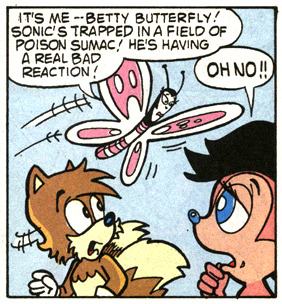
219 notes
·
View notes
Note
This might be a big question but what would be the ideal way for the raven king to have ended in ur opinion. Bc it doesn’t make sense as is and thematically falls apart I feel but I can never quite figure out what the actually most narratively satisfying thing would be
lets get married. okay keeping in mind i haven't read the series in full in a couple years my core issues with trk are: i think gwenllian was criminally misused, i think adding in laumonier and blue's dad made very little sense and i think doing the gansey noah and cabeswater deaths back to back the way they were was a terrible way to handle a climax. you don't need blue's dad and you don't need laumonier. too many random new parents and men who are absolutely vestigal. gwenllian should be blue's mentor, you focus the piper plotline completely on a professional antagonism between her and henry's mom who can act as the antithesis to piper's greed and recklessness. the grey man is the reader's familiar link between Crime and Magic here, so you can still have him face the challenge of his old life threatening his new life by having to forge an alliance with seondeok to take down a shared threat.
gwenllian as blue's mentor would come with a similar but almost opposite effect to persephone's mentorship on adam: blue isn't getting stranger, she's getting angrier. this witch who knows what she is keeps getting mayo in her hair and her teachers don't understand her and her family is being evasive and the boy she loves is going to die. also a demon is clouding her perspective, but she doesn't really know that yet. more adam and blue scheming to keep gansey alive. more research and bugging relatives and desperately looking into rituals while it becomes clearer to the reader that adam is losing his agency and blue is losing her clearsightedness. gansey's panic attacks begin to attune themselves to the moments where noah is not himself as well. his chest hurts, he can't breathe - it feels like something is sucking away at his heart. at the same time adam is still trying to help ronan with waking up the dreams, and blue is getting closer to gansey and henry, trying to imagine a future that feels like her own when she has the weights of her confused identity and her fate hanging around her neck.
i would have ronan and gansey's relationship blow up here: between the hospital and aurora's death, maybe after his birthday party, ronan finds out - probably through declan, to add insult to injury and even more fucked up brother resentment - that gansey is trying to buy him a diploma. actually definitely just after the night of truth bullshit for prime outrageousness lmao. it goes nuclear. blue is, catastrophically to gansey, on ronan's side. adam is, infuriatingly to everyone, judgmentally neutral. things progress as they were except instead of henry getting kidnapped we get a very reluctant henry passing a message to tgm - things have progressed past the point that is acceptable with piper, and his mother wants to meet. also the visit with gansey's family is tense - they love her and henry, and they just can't understand what's gotten into gansey, who's distracted and snappy, and when helen confronts him, he blows up at her, saying a lot more about his worry for ronan and his fear about what will happen to him than was revealed in the initial fight. they're siblings, their relationship can handle it, but there's still an overarching sense that she doesn't really understand, because gansey is still holding his real fear of dying close to his chest.
cut to auroras death and the grey man having to leave maura with this tragedy to join seondeok - a king, joining a king, doing what needs doing, instead of just a continued trope about being made for violence or whatever that was. there scene with ronan at the bmw goes more or less the same. gansey goes off on his own because he feels isolated and like the burden of fixing all this lies on his shoulders, gwenllians weird witch pep talk goes to blue instead. here is where you would insert cool fun shit about what being a mirror actually means! all of them reunite as in canon, ronan and gansey reconcile after ronan is like you dumb motherfucker i need you here you're my brother and gansey says some self sacrificing shit and blue and adam make it clear without Making It Clear they are going to stand by him, because they still don't know he knows he's going to die.
here is where we reach the core difficulty: i think the death kiss is incredibly stupid and i don't know how i would write around it. i know how i would finish trk from here, but the kiss curse would not show up at all. i like the kiss curse as a concept but it just doesn't make any sense in the narrative of agency trc constructs and i think it limit's blue's storyline. so without considering the kiss curse: as the demon hijacks adam and tries to use blue as an amplifier to spread to other ley lines, everyone realizes the stakes. everything cabeswater has touched, everything the ley line has touched is at risk, and the ley lines are ALL CONNECTED. blue and adam have been skirting around the realization that the demon and cabeswater are like mirrors the whole book. you can't have one without the other. there is no corruption without something to corrupt. the way cabeswater focuses the ley line for ronan is how the demon has been getting power too, but it's a self contained loop, consumption instead of guidance. kill cabeswater, kill the demon. gansey asks it, realizing in a way they others don’t seem to that he and cabeswater are linked, and the others act. there's a little giving tree moment between ronan and cabeswater, which will surely not contribute to any farreaching survivors guilt that might show up in a sequel series. here is where blue being a mirror comes into play. when neeve was trying to see farther than she could, she used a mirror and it sent her there. the demon is trying to consume beyond it's bounds. a mirror sends it inwards. here blue sees the moment of violence that birthed the demon, and she's terrified and it's tragic. it's a very bildungsroman moment of grief and terror of what will come after for everyone. death of the child birth of the man etc. noah, perpetual child, gets laid to rest with cabeswater, but without cabeswater the ley line floods. here is where gansey dies: without noah fighting his hardest to keep him going, because noah loved him, because cabeswater needed him, his heart simply stops. here is where blue kisses him, because it doesn't matter any more, because he dies even though she didn't, because she's seeing without the demon clouding her for the first time in what feels like the longest time and all she can see is grief. shit gets magically weird with adam and ronan too, and it's henry who grounds them all, who is used to enforcing practicality on the unknown to keep himself safe. with his help the three of them dream something to save gansey. ta da!
i feel like this would also feed much better into the theme of the dreamer trilogy of like opening ley lines etc bcus trk completely glosses over what happens to the ley line without cabeswater there, and adds to it making sense that ronan thinks opening the ley lines is a good idea - he saved gansey with it! what more could he do! whereas adam felt overwhelmed and out of control and spends the next year trying to construct and repair his own real life conduits and safeguards on the ley line as ronan builds lindenmere. what are your thoughts did i miss anything that you were like absolutely not hate that need it to be gone
47 notes
·
View notes
Text
The racism in Lotr really is the worst................like.....Lotr supposed to be this story about love that transcends where you’re from or who you are, about different people coming together at the end of the world, but that message ends up feeling so hypocritical when racism is embedded in the fabric of how Tolkien wrote Lord of the Rings, and in how Peter Jackson and co chose to mindlessly reproduce Tolkien’s racist coding in the films.
I do ultimately have the view that you can enjoy things while acknowledging terrible aspects of them. I don’t believe we have to throw Lord of the Rings out, just that we should “understand the author’s prejudices, and be mindful of how they affect his work.” But again I’m white, so this issue isn’t really as painful/visceral for me.
But yeah it’s just....... Lotr is about the good quote “white-skins” from the English-coded countries of “the west” fighting the quote “least lovely Mongol types” and “black men like half-trolls” and “slant-eyed foreigners” and Asian-coded easterlings/African-coded Haradrim of the sinister “East...” I know people like to twist themselves into knots trying to explain how it’s Secretly Not Racist (even though it obviously is) but it’s horrible that there’s clearly a reason so many people on the far-right see Lord of the Rings as something that validates their awful awful worldviews. It’s ultimately a story about the Good White People from the West vs the evil POC from the East. The speeches about the glory of the West wouldn’t be out of place in videos by vicious monsters like Jordan Peterson
And I know that some of the racial coding on the heroes is ambiguous in the book (like Sam) but I hate it when that’s used as a way for people to pretend Lord of the Rings “secretly isn’t racist at all.” Like, Sam is described as brown, and you can make a convincing argument that Tolkien intended for him to be a POC-- but Sam is the pale white Frodo’s lower-class servant who literally calls Frodo his master. A couple characters possibly being POC doesn’t fix the huge overarching problems with the insidious way Tolkien used racial coding (white/fair= good, hero, wealthy; brown= evil, villainous, lower-class, servant, shady). It’s not a problem of a couple characters or just “not enough representation,” it’s a problem with Lord of the Rings on a deep thematic level.
Side note: I do think the racism in the Peter Jackson films is different from the racism in the books, but I am also very wary of this Thing I occasionally see where people act like the PJ films were the ones that created all the racism...... the PJ films deserve every ounce of criticism they receive on the way they handled race, but the books do as well, and I’m uncomfortable when people bring up the racism in the pj films specifically only to downplay, excuse, or flat-out deny the racism in the books. Even if a lot is different the overarching problems with the horrible racist coding in the films have their origins in the overarching problems with the racism/racist coding Tolkien wrote.
It’s a problem with literal racial cariacatures like Ghan-Buri-Ghan, and all the times when Tolkien uncritically portrays colonialism as a thing that was ultimately Fine while portraying the people who fight back against their colonizers as Deeply Misguided at best (the Wild Men joining Saruman because they don’t understand that the Rohirrim who colonized them are Good Actually.) And thematic things like the way the book ends with the Shire closing its borders to anyone who isn’t of their race, and this being portrayed as a good decision. earlier Tolkien says “the wide world is about you-- you can fence yourselves in, but you cannot forever fence it out” but in the end the Shire just fences the world out, fences out all the foreigners and immigrants, and this is portrayed as the Right solution to their problems. (Honestly I HATE this plot point so much! It also is a clear example of what I was saying about how the racism/xenophobia is hypocritical...the plot point where the Shire fences the world out makes no sense with the overarching idea that “you cannot forever fence the world out.” Tolkien was so busy being xenophobic he didn’t notice it contradicted the themes of his own book)
I really hate how that hypocrisy really is at the center of Lord of the Rings-- the hypocrisy of preaching love and kindness while at the same time coding the villains as POC and coding the heroes white, the hypocrisy of trying to be a critique of fascism/the industrialization of war while using imagery that fascists love and agree with.
I’m not going to throw Lord of the Rings away, because I imprinted on to it when I was a Child and it’s incredibly important to me. I especially need Lord of the Rings now, because it helps me get through times of stress! But I do think that part of adulthood is realizing that you can’t love anything “purely” and it’s okay to have complicated relationships with the things you care deeply about. I also think that if your love for something is so shallow that it shatters under the realization that it’s deeply flawed, you might not have actually loved it that much to begin with.
Idk if this is coherent but a major theme of Lord of the Rings is that stories are like language; they have to grow and change with the cultures that created them if they want to stay relevant. And if I want to end this essay on a somewhat hopeful note I’ll say that I think if lotr wants to stay relevant, it does need to change, and it’s capable of changing. And acknowledging the deep awful racism of the original story is the first step to allowing the story to grow.
590 notes
·
View notes
Text
Process Blog Week 1+2
Before I began this class I had a different view of graphic design. I always thought of graphic design in a literal sense, but I never knew of the many different professions and Intricacies of the field. After my reading this week I’ve discovered and learned so many new things. The book talked about the traits and skills needed to become a graphic designer. One of the graphic designers I read about was Gail Anderson. Her Typographical skills stood out to me. Her work made me think about how graphic design and typography relate to one another. I have never put text over an image before this class. I assumed that it would be an easy task, but that was not the case. Project 1 dealt with putting font over an AI-generated image in Photoshop, to create a 6-word Memoir. While this seems easy enough it does present us with questions and limitations.
1.) What Font, Size and Color? - Choosing a font is an important part of making a graphic image. When using text in a graphic I learned that It’s important to choose your font carefully. When I was first experimenting with Photoshop I played around with different fonts, font sizes, and font colors. All these factors attribute to the final look of your graphic, so you must make these choices wisely, so they coordinate with your overarching idea. I will talk more about fonts in Memoir 1.
2.)What are the Limitations? - The biggest limitation of project 1 was the AI, Craiyon. This technology is amazing but it does have its limitations. The Resolution of the AI-generated images was low, which resulted in pixelation. The AI struggled to create realistic things, this stumped me in the early stages of development. A lot of the Ideas I had were not possible with the limitations of the AI. I wanted my designs to be appealing, but the AI was generating unusable content. From this point on I started to brainstorm more stylized ideas for the AI to generate.
Memoir 1
This is my AI-generated image for Memoir 1. I instructed the AI to generate an image of a storm. The original idea was to make an image with heavy text, and a softer background. I wanted to do something more personal to me with this Memoir. The concept was how I depict my negative emotions.

This image below is Memoir 1 with text. I think the overall image achieved my concept. The fonts I chose for the image were chiller and Bernard MT Condensed. I liked the fonts I chose, I think they complement the image well. This was a very font-dependent image, and this memoir gave me the chance to experiment with different font types and sizes.
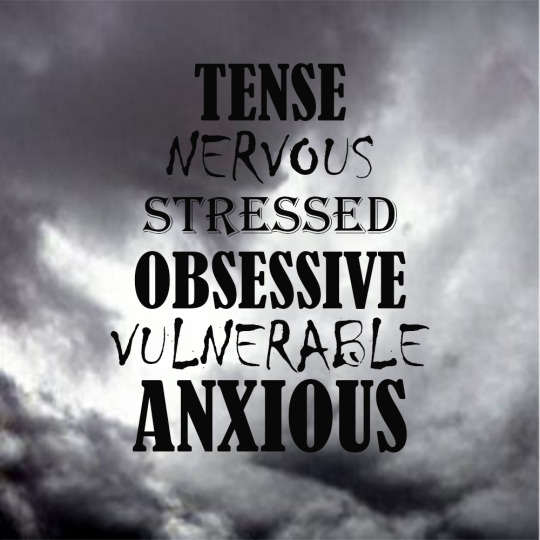
Memoir 1 Critique
During our critique in class, my group suggested a couple of fixes that could make this graphic better. One of the first things was text size. As you go down the list of words the sizing is inconsistent and has no pattern or sense to it. I agree that the sizing of the words needs to be improved.
Memoir 2
Below is the original generated image for memoir 2. Memoir 2 was challenging for me, I had to give the AI multiple phrases to get the image I wanted. Though I had to rephrase the wording I think the AI did a good job of making the image I desired.

The text was inspired by the AI-generated image. It took me a while to string the words together, but I like the words I choose to go with the image, I feel it is very fitting, the final Memoir is below.

Memoir 2 critique
During the critique, my group suggested changing the font to something bolder to fill up the empty white space. I think there is room for experimentation with the font of the image. I also think the font could be transformed to fit around his head better as well. The major issue they had with memoir 2 was the faint line left behind where I imported the image. It was a major oversight with the project, once you notice it you can't unsee it.
Week 1+2 Concludes
After my first two weeks in ARTS-102, I learned the basics of Photoshop and a little bit of Illustrator. I'm still unfamiliar with some aspects of these programs, but that's why I'm here, to learn. Not only am I learning about these programs, but I'm learning the skills I'll use one day as a graphic designer.
2 notes
·
View notes